#i embody movie!carol the most when
Text
Final girl (Noun): An Introduction.
According to some, I guess I owe them an explanation. But let's start at the beginning - at least.
What is a Final Girl?
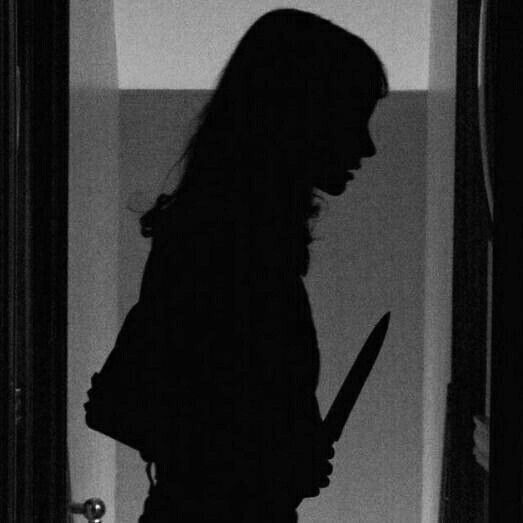
Coined by film theorist Carol J. Clover in her 1992 book Men, Women, and Chainsaws: Gender in the Modern Horror Film.
The Final Girl is a character (classically female presenting) who is the last person alive to confront the killer/monster, and often the sole survivor. The final girl is a trope in horror films (particularly slasher films ).
A common plot in many horror films in which several victims are killed one-by-one by a killer amid increasing terror, culminating in a climax in which the last surviving member of the group, the final girl, vanquishes the killer (at least until the sequel).
Why would I want the moniker or call this blog Final Girl Kell?

The final girl trope has evolved throughout the years, from early final girls most often being DIDs (Damsels in Distress), saved by a strong men to more modern final girls who are more likely to survive due to their own abilities.
For many, the final girl is the living embodiment of stereotypical conservative attitudes of what women "should be"—virginal, subservient, untouched by the menace of the outside world. But as the trope evolved, the trope was used to force the audience to identify with a woman in the climax of the movie. The person you root for to win. That became a very powerful sword to wield. It allowed new points of view in horror storytelling.
When women won, they were able to force men to watch them step into their own power.
The name Final Girl Kell is a large part wish fulfillment.
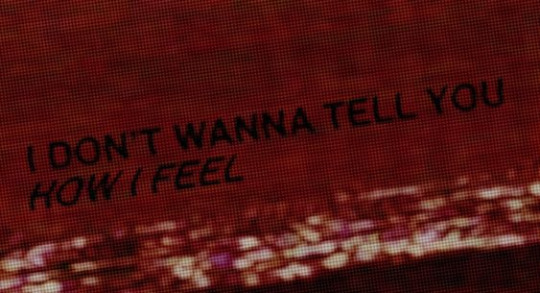
I'm not here to trauma dump, nor give some sob story - at least not all at once and not for the public to twist and use against me as some things have been in my past. It's what the public does to victims of abuse when they speak out and that fall out I know all to well to try again.
The quick notes version is I've been the innocent who was forcefully defiled by the monster of men. I've had my life completely derailed by others selfish needs and desires - others fears and needing to single out someone to hurt to deal with their own insecurities - and I've had to bear the brunt of that fallout, living in a life feeling confined to a box others made to try to kill me.
I'll give them it was a trap my own naivety caused me to fall into - trusting the wolves in sheep's clothing - but the Final Girl always makes it out of these traps. They always fight and claw their way back out to come back and take those monsters down. They make it out to see another day. To live another day. To be free of the monster hunting them down.
As a survivor, especially one a lot of people see as "not perfect" I identity with that.
I've been to the edge and back and I've gotten free. I've won to see another day. As someone still dealing with picking up the pieces of my trauma and more recent battles - I hold on to the trope like a mantra. I will survive, and I will thrive. I will be free to see the light of another day.
As a child who grew up on whatever I thought sounded cool at Blockbuster and loved all things spooky - Final Girls like Nancy, Sidney and Laurie always stuck with me. My inner child and adolescence begs me to tap into the power those Final Girls had - and I have to honor that.
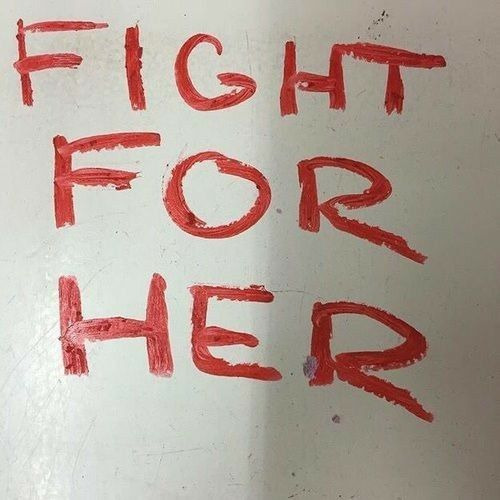
What is the goal for this blog?
Benny: But I still want to know what happens!
Buffy: Everyone gets horribly killed except the blonde girl in the nightie who finally kills the monster with a machete but it's not really dead.
Jennifer: Oh my God. Is that true?
Buffy: Probably. What movie is this?
— Cut dialogue from Buffy the Vampire Slayer
I can't say what I plan for this blog to be totally.
Part health journeys - with my mental and physical health in some serious need of TLC.
Part writing out ideas for horror screenplays based on the insanity I'm dealing with and the terrifying situations living in Atlanta brought me into.
Part just spooky stuff I like, and showing off the positive progress I've made. Be it showing off a cool skill I've taught myself (like with ghost hunting) or musings about Halloween Horror Nights and showing gratitude for the things and people who make me want to never give up.
I can't say I have everything figured out, but I'm down to start this blog journey and I hope others are excited to read, listen, watch and hopefully relate.
We're all final girls here.
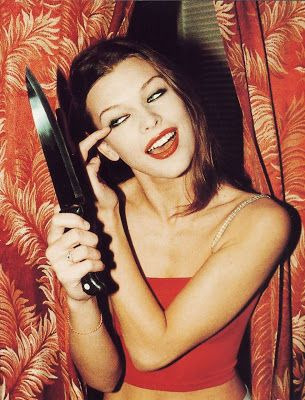
#horror#halloween#final girl#final girl kell#blog#intro#blog intro#halloween horror nights#ghost hunting#workout#fitness#diet#scream queen#sidney prescott#laurie strode#nancy thompson#90s#mutant fam#horror girls#horror movies#horror films#scary#slasher#horror film#personal blog
54 notes
·
View notes
Note
the problem with pggy is that she’s had more than enough time for a decent characterization but she still doesn’t have one. she either appeared or was ref’ed in all captain america and avengers movies and even had her own spin off & is now getting a whole new arc as cap carter but she’s still the most written-by-a-man of all mcu heroines. the carol danvers test imo is an excellent indicator —because despite being sexualized to beat hell by them, nat’s solo film was still hated by many male fans. i daresay pggy is more “punch men!1!!1” than natasha or carol, so why didn’t her show get the hate they did? why didn’t cap carter get the hate jane foster is getting despite the fact that they both got the mantle from their male counterpart? because pggy is a caricature of a strong woman, and she doesn’t go through painful, transformative experiences that humanize her like other mcu heroines. the fanboys are happy with her girl power propoganda because there’s nothing to remind them of her personhood, so she doesn’t challenge their sexist convictions. she’s a sparkly pink banner with girl power written on it, not a real woman who wields actual power (later when she becomes one she uses that power to immortalize the guy who tortured the best friend of the “love of her life”. relationship goals or what). and no, hiring n*zis doesn’t make her multidimensional or grey. it just makes her a bad person lol. a grey character only works if you address their moral ambiguity. mcu and pggy fans gloss over her lack of morals by calling everyone who points it out a misogynist.
still don’t think she’s one-dimensional? just look at the producers of her spin off, the actress and her fans. the only way they describe the character is “badass” which literally doesn’t mean anything anymore. also; not just badass, but badass without having to forsake femininity (the actress’ exact words). i’m gonna assume by badass they mean strong and no-nonsense for argument’s sake, *regina george voice* so you agree? a woman being strong and no-nonsense is only acceptable if she conforms to white western ideals of femininity? and therefore pggy carter was designed to be a strawman of the kind of feminism which men deem appropriate? they really told on themselves.
(in ref to <<<)
The Carol Danvers Test (Your movie/game/book/play passes if it incites men’s rights dipshits to boycott.)
.
You're so right when you call Pggy the 'most written-by-a-man of all MCU heroines.'
Because she looks immaculate at all times and, despite being a Fantasy Powerful Woman, has no power or significance outside of a man, she doesn't challenge patriarchal values.
So she's palatable to shallow and/or anti-feminist men, tradfem women, and those lacking in critical thinking skills.
(To the hard-of-understanding, 'not being a housewife' and 'being a feminist depiction' are interchangeable terms).
Pggy has also had more golden opportunities than any other character to speak out against Fascism and Fascist values and explicitly state that she's in the war to combat Fascism, the way Steve was, and yet she still has not.
(And could not, convincingly, since a lot of what Fascism idolises she herself embodies, and she has knowingly worked with and aided Fascists across the multiverse.)
Which, again, is an appealing quality to a certain sort of... Disney fan.
.
So, as you say, she has no personhood.
And the stupid thing is, Disney can't even give her any personhood now, because all the backstory they could have used to flesh her out (from comics Pggy or all the other love interests of Steve), has been rendered completely unusable since she's Cynthia.
They can’t even give her her signature hat, because they put her in the wrong location and it was local to the place she lived in, in the comics.
Everything that could have given her an independent identity, outside of a man, they threw away, just because they wanted to show a Sexy Nazi.
.
And Natasha is a really interesting character to compare.
Not just because of the Carol Danvers Test, (which, yeah, that flashes up all the red flags for anybody curious to know whether something is feminist or not!)
But because Natasha was both deliberately and inadvertently sexualized in her intro movie (because of misogynist writers/directors).
But whereas she was deliberately presenting herself that way – to manipulate a foolish philanderer – Pggy presents herself that way just because the writers and actress think a woman looking good is Cool and Important, and also that men wanting female characters to look like that all the time is Fine, Actually.
(And, whereas Nat's self-expression is also a tactical choice, Pggy's is never presented as a choice; because no women at all in CATFA, AC, WI, etc. appear anything less than immaculate, even in the background).
They thought all the aesthetics, sexualised violence, and claimed (but not proved) job titles 'fixed' the problem of a sexy female character being there just to be the Male's Love Interest.
But in fact, their failures only exaggerated that problem.
.
Despite how flawed and inconsistent Nat's characterisation has been, Nat also nevertheless highlights what strong female characterisation looks like, compared to Pggy.
She gets to be a friend, a sister, an enemy, a surrogate daughter, an employee with a clear remit. Not just a Love Interest. Her opinions are actually listened to. And she gets to succeed where men have failed (eg. in evading capture as fugitives).
And, she has a temperament & personality type which make her well suited to being a spy; her comfort level with fluid identity (as a direct result of her unique backstory) is an ideal quality in someone who has to resort to subterfuge.
(And also, conveniently enough, it makes her varying personality between films seem understandable!)
So being a spy is an organic choice for Nat; a spy is a plausible thing for her to be, based on who she is as a person.
And because this is a genderless trait, not part of a restrictive gender role, even though she is sexualised as a woman, her depiction is therefore more feminist. (You see the same cool, remote affect in male spy characters like Agent Coulson).
Compare that to just making a woman a spy because- well, spies are sexy and look at her!!
Pggy, on the other hand, is absolutely all wrong for her (alleged) profession.
She is blunt and brutal, blundering and oblivious, a bull in a china shop.
But she’s a spy (is she tho??) because spies are Sexy!!
.
Another aspect of Nat which makes her suited to being a spy, which Pggy lacks, is accurate self-appraisal.
Every single claimed skill Nat has, is supported by canon evidence of her competence.
(Some examples:
she can get 'genius' Tony to hire her with barely a word,
she can do her fake job well enough that Pepper doesn’t query her being hired, despite the obviously-shallow reasons Tony did it,
she can lie so convincingly that even Steve takes a while to notice,
she can disguise herself so well that not even Alexander Pierce realises he's talking to her until she reveals herself,
she can manipulate using misogynist expectations of gender roles (which is more difficult and therefore impressive in a post-feminist society) so well that even the ancient Actual God of Lying does not realise what is happening,
she comes up with the solution to the wormhole over New York over the self-identified 'expert in thermonuclear astrophysics'
she is capable of running SHIELD and is actually shown doing that instead of them just telling us she did it (and is accused of being, if anything, over-efficient!)
etc. etc.
Sorry Steve, but Nat is far and away the most intellectually capable Avenger.
Pggy, on the other hand, merely thinks she's cleverer than everyone else.
Despite all her claims to competence being almost universally (and almost always immediately) disproved by canon incompetence…
(Some examples:
She's anti-bully? But then she's not defending the weak from the same bully (so it's just her own skin she cares about. And if that was supposed to show she’s anti-misogyny, then why is she immediately calling the men ‘ladies’ as an insult and comparing them to her grandmother?)
She's good at military stuff? But then she's not reaching a grenade in time / or recognising a dummy / not important enough to be told about it (or to be made part of the discussion over who will get serum).
She's in charge of anti-sabotage? But then she fails to clock saboteurs loitering outside the Top Secret Lab, so they're immediately sabotaged.
She cares about the people of Brooklyn? But doesn't give a shit about starting a gun fight in the open street or bombs going off.
She's good at shooting? But then she's missing every shot (and blaming Steve).
Her opinion was important to the men in WWII? But then she's being told nobody gives a damn about her opinion, she can be sacked because she's disposable, and Steve ignores and directly opposes everything she suggests, even from inside a vitaray tube.
She's demure? But then she's groping Steve, accusing him of being indecorous when he is sexually assaulted, turning a blind eye to Howard Stark's overt sleaze, and then mimicking Steve's sexual assault to get a kiss.
She's all common sense whereas Steve is 'so melodramatic?' But she's the one throwing jealous temper tantrums, (quite literally throwing her weight around, in WI), firing guns at her own people (like Red Skull), interrupting and risking the failure of a billions-of-lives-at-stake mission to make Steve kiss her.
She's self-made despite period misogyny? But men are handing her almost every job she's ever had, without interviews (and the ones without interviews were for jobs that would accept either literally any woman, or only women of her class).
She's saying being a woman makes her a better spy than men? But then she's failing to notice a Black Widow has moved in next door until she is kissing her on the mouth. (So, the show agrees that women Can make brilliant spies, but not This woman?)
She's Antifa like Steve? But then she's willingly working with and immortalizing the very Nazi he fought to stop, in two universes. And so on and so on and so on and so on … )
…Pggy continues to believe she is competent.
The writers, and the actress puppeting her, believe that competence (and honour and decorousness and intelligence and perfection) have been shown.
If I was going to mantle-swap Pggy with a character who fits the skillset she actually has, rather than just the one she only thinks she has, it would be some kind of She-Hulk.
Rage, bluntness, and violence against men are already a part of who she is, whereas subtlety and decency are not. (And the people writing, playing, and stanning her already think Woman + Violence = Good Characterisation). So why not?
I can't say I'm sorry someone likeable and capable is actually playing that character though.
.
On that note, I was going to say that I've noticed – and this is kind of telling – that the moments when Pggy feels most natural, on screen, are the times when she is irritated and snapping at people, or being patronising.
Sadistically revelling in violence? Sexually assaulting someone (twice) out of a sense of entitlement? Talking to someone like they're a child? Praising herself? No problem! Those are the most characteristic moments!
But as soon as HA has to do a scene of Pggy feigning compassion, the acting immediately falls down and becomes stilted and amateurish.
Contrast her with the actors who do moments of humanity and compassion really well; Mackie, Hemsworth, Boseman, Stan, Isaacs, Tucci, Holland. Even greedy RDJ makes Tony’s brief blurts of life-altering largesse, to poor people, come off as very human and believable.
But what HA reminds me of most is Jennifer Saunders doing deliberately-bad acting in her comedy show French & Saunders.
(Seriously. Look up their Silence of the Lambs parody and tell me that's not HA!)
.
And I agree, hiring Nazis doesn't make Pggy grey or multidimensional, because specifically fighting Nazis is CATFA's #1 criteria for what makes a person good (like Steve) without room for ambivalence.
And because 'grey' implies an impurity of ethics which none of the people involved (with the writing or acting of Pggy) believe she possesses.
They don't think she did anything wrong!
If they did think hiring Zola was wrong, they wouldn't be rehabilitating him in their animated series. That's Disney's solution to her hiring Nazis. Not even claiming that she didn't do it, just that she did do it, only they were 'reluctant' Nazis, nice Nazis!
Just like the ones the American government collaborated with under Operation Paperclip? Just like the ones Good Old Uncle Walt welcomed into Disney, right?
.
There are a couple of interesting parallels between Pggy and Jane.
First, they have both been brought back from obscurity, just when it looked like a black person was going to be taking over the hero's mantle.
(If they wanted to make Thor female, after Ragnarok, and Jane and Sif were no longer in the picture? Then literally the only possible candidate was Valkyrie. It’s hard not to read Jane’s return as a sign of anti-diversity panic. I'm relieved that the sequel is being handled by Taika Waititi, despite Ragnarok’s flaws, because I'm hopeful he will resolve these unfortunate implications? Maybe sapphic-ly?)
Second, both Jane and Pggy were violent towards the men.
I hated that scene for Jane just as much as for Pggy.
(But whereas Jane was a teeny human slapping a giant invulnerable God, Pggy was firing a gun at a man who is not invulnerable to bullets. Jane was actually in an established long term relationship with Thor, including cohabitation, whereas Pggy wasn't even dating Steve. But the depth of relationship, and the fact that one man could easily survive but the other could not, is beside the point; the violence is equally emotionally abusive and unacceptable in both cases.)
And it’s notable that the female director quit TDW specifically because she was worried about being blamed for a poor script.
So the other movie where a woman attacks their love interest, a female director would rather disavow, but in CATFA it’s feminist?
.
Outside of this moment of similarity, of course ‘mens rights dipshits’ hate Jane, (but not Pggy), because Jane has a power base and career outside of men! (Just like Carol!)
She was a world-leading astrophysicist before Thor ever came along, and in fact the only reason she even met Thor in the first place is because she was so good at her chosen profession that she correctly predicted where he would appear (twice!)
And, she was a vital component in Thor recovering his power in T1!
Whereas Pggy's profession was chosen for her by her brother.
And, as charmed as Pggy's life always would be, as an Upper Class woman, if you delete Steve and Howard from her life, who is she?
What has she accomplished or aspired to, outside of those men?
Even in two other universes, her entire career consists of bearing Steve's chosen standard (or based in an organisation named after it).
And yet she is so irrelevant to Steve's life that she fails the Sexy Lamp Test (technically she falls under the subheading test of ‘Sexy Lamp with a Post-It Stuck On’.)
In fact, she would have derailed Steve's Hero's Journey completely, had she ever actually done anything.
If she had stopped the grenade, Phillips never would’ve realised he was wrong and Steve never would've been picked for serum.
If she had stopped the murder of Erskine, other super soldiers would've been made.
If she had stopped the saboteur fleeing, as WI shows, Steve never would've gone after him, never appeared in the newspapers, never been put in the USO tour, never become Captain America.
Steve's empowerment literally, literally depends on Pggy's powerlessness.
And yet people think she is a feminist character!
Oyvey.
.
White Feminist Pggy also prevented Daniel Sousa from protesting the suppression of women, just when it would have helped her fellow female agents - because she knows her value (and “no one else's opinion” matters. Including other women's? So, keep the glass ceiling in tact, for them? Defend herself, and her personal simps, from being pestered by men, but not other women from being pestered by Howard Stark? Feminist how?)
Unlike Pggy, Jane is a woman in a position of power who has clearly used her achieved (not gifted) position to uplift other women, because her intern is another woman.
And a good looking woman, too!
And she's allowed near Thor! Even allowed to touch him!! And comment on his good looks!!!
Pggy would never.
Pggy inserts herself whenever nurses try to get near Steve, for his health, (whereas Jane is willing to drive Thor to the hospital even when he is a total stranger and she will get in trouble for doing so).
And (as mentioned) Pggy becomes physically violent when Steve expresses interest in other women. (Which is, naturally, shocking to her, as the Only Cool Girl In the Universe).
But HA, the writers, and the stans, think the shooting scene is feminist just because Pggy is not attacking the Other Woman.
(And, somehow, miss that we've been given 'without a man loving her, this silly girl cannot handle her womanly emotions, abandons all sense, becomes hysterical, and makes a violent Scene at work' and 'violence against men is Fine and Hilarious because Gatekeep Girlboss Feminism Slay'.
Gimme a fuckin' break!)
They're so deep in 'women are just sexual competition for men' mode that no other good-looking women are allowed onto the screen with Pggy unless they're a simp or a villain or both.
In AC and WI, like all good Mary Sue narratives, the supporting cast are quite literally that, support; people are paraded on screen to either praise her or get their comeuppance for not (and die and/or be proven wrong for criticising her).
And if somehow another good-looking woman still manages to become a fan fave? Write her off and insert a fat sidekick instead! That'll fox those pesky lesbians!
Or if fans complain about lack of POC? Wheel on a black man to simp and then be killed, after orchestrating Plot Reasons why he can’t be too sexual!
(Black women may be pictured in the back of shot, but may not be allowed to speak, lest their existence outshines Pggy’s reported wokeness, or their haughtiness offend her.)
.
And Pggy hasn’t had to change, because Disney don’t want the extra hassle of having to please the people who are capable of seeing something amiss – if they’re even aware of anything amiss.
HA has only to say 'feminist' for casual viewers to believe that therefore they have been shown feminism, and that anyone who thinks her writing isn't feminist must therefore be a self-loathing misogynist.
Or, my personal fave, that anyone who notices this is just 'thinking too hard' and it's 'not that deep.'
Why is it only ever 'thinking too hard' when you’re talking about something people feel embarrassed for not noticing?
And, hey, let’s get nuts with this – what a coincidence, that this precise brand of anti-intellectualism is one of the cornerstones of Fascist thought? (Which is why they imprisoned intelligentsia alongside minorities.) And that glamourising 'not thinking hard’ is exactly how you make 'not questioning things' fashionable, too. (Authoritarian bodies want universal acceptance of their answers, not more questions). Which in turn generates homogeneity and conformity. Which is super convenient when someone wants to address you and make money off you!
Like, oh, say, a many-headed media conglomerate?
Is there a reason why this attitude is common among people who love the perfect Fascist woman, who hires, works with, and immortalises Nazis, and now canonically deemed herself worthy to be made an ubermensch, in imitation of the uber-ubermensch, Red Skull?
Nah, it must be that I'm just obsessed with making everything gay, and jealous that they made the 'normal' ship canon.
Yeah, that must be what's going on here.
I shouldn't rock the boat.
If GiantMediaMonopoly says a thing is good, I should just agree.
I shouldn't 'think' too deeply. I shouldn't 'question'. I shouldn't demand to see human depictions of my gender. I shouldn't insist that Jewish writers' creations should not be paired off with Nazis or Nazi collaborators, in any universe.
And if men want to write women that are nice-looking but ultimately useless, I should either stop noticing, or just shut up about it.
As long as I know my value, anyone else's opinion doesn't really matter.
#LONG POST#antipeggy#antisteggy#p*ggy meta#mcu meta#mcu critical#steggy is hydra trash party#meta#mcu#tw peggy#toAyourQ#hey nonny#dat's me#sorry this took so long#but I accidentally backspaced out of my first draft 1/2way thru and was so pissed off I had to go away and think about things#before writing it all over again 😫#the AC Anon#yet each man queues the thing he loves
80 notes
·
View notes
Text
It’s Okay - Part 2
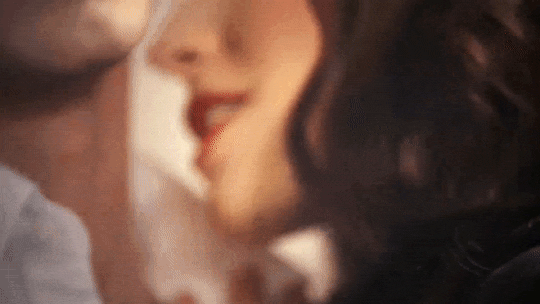
AO3 Link: https://archiveofourown.org/works/41355318/chapters/103701501
Relationship: Stommy aka Steve Harrington/Tommy Hagan
Summary: “You still have it? After all this time?”
“Yeah. I’m sentimental, I guess.”
“…Can I see it?” Maybe it's finally time to talk about it.
CW: Non-SFW, lipstick kink, cum sharing, blowjobs
Words: 4.3k
So much time had passed. Or, it felt like it had.
Five years. Most people you met in high school, you’d leave behind in that time.
It was weird to think Tommy was sitting in Steve’s beach house on the coast of California, the one his parents had given him the rights to at twenty. Tommy had moved out all this way to be with extended family as he made his way through his engineering degree, but he had never imagined Steve picking a location so close to him. To bump into him again after they graduated. He didn’t expect to become tentative friends again after their fight in junior year.
It was like old times, but they had grown up in their time apart. Tommy let himself become a little softer at heart, worked on his own insecurities so he wouldn’t jab at others. Having his abuelita around in his daily life made it easier to remember to be kind.
Steve had grown out of his immaturity as well since their friendship ended, leaving a hard working, warm man that was the embodiment of a safe haven. Steve hadn’t rejected him when they saw each other again. In fact, he smiled, greeted him, and asked how he had been. He saw the apprehension in Tommy’s gaze and reached a hand out.
Now, both twenty two, they had regained their old friendship. The easiness of cracking cold ones open together, laughing at bad jokes and throwing popcorn at each other on movie nights. Tommy still smoked unlike Steve, but he had the curtesy to cut back so he didn’t smell so strongly of it when he visited.
Steve had broken up with Nancy long ago. Carol had dumped Tommy at the start of senior year. Neither had really dated since, but Tommy had hooked up with a few people since arriving to Cali. Yeah, people. A few women, one man. He had been drunk at the time, they both had been, but it was like it was suddenly a lot less terrifying. Knowing. Acknowledging that it wasn’t a phase or teenage hormones. He didn’t parade a rainbow flag around, but at least he knew it now. That he liked both.
Steve liked both too. It was something he didn’t hide, something that just slipped into the conversation with a casualness Tommy didn’t think he’d ever have. Steve said a lot of things, left-field, with little edge or unease.
“I almost died like, twice in high school.”
“I’m surprised the government doesn’t have a warrant out for my arrest.”
“Kids always get superpowers. Adults should have them, we’re the responsible ones…No, I take it back. I’d use it for evil.”
“I once fucked a girl with a dick. Wasn’t bad. I just wish I remembered her name.”
“All my friends ended up gay or lactose intolerant…or both.”
“I wanna be mad at Robin for fucking my ex, but more than anything? I wanna ask Nancy if Rob rambles during sex too.”
“Do you remember that time I made you try on a bunch of my moms lipsticks?” Steve sipped his beer. “I still have that red one. I was gonna give it to Nancy. Couldn’t though.”
“You still have it? After all this time?” Tommy asked in bewilderment.
“Yeah. I’m sentimental, I guess.” Steve shrugged and picked to the label of his beer. “Sorry. That was weird, right?”
“I’m just…surprised, mostly.” Tommy admitted, clearing his throat and shifting on the couch.
“I keep it in my bathroom. It’s pretty, gold case and everything. Used to be shiny. Not so much anymore.” Steve chuckled and took another swig.
“…Can I see it?” Steve swallowed and looked at him, brown eyes scanning him.
“You wanna see it?” The questions intention sounded heavier than Tommy liked.
“Yeah…I wanna see it.” He looked down and fiddled with his own bottle, condensation damp against his palms. Steve was still looking at him, he could feel it, before he leaned over to place his beer on the coffee table and heaved himself off the couch.
“I’ll be a minute.”
Tommy’s head was spinning as Steve walked away, leaving him alone in his living room. This was all kinds of wrong. They never spoke of that day after it happened, never dared, and now five years later Steve was casually bringing it to his attention and Tommy was encouraging it?
Nothing was guaranteed to happen. Tommy knew that. But the air felt thick with tension when Steve came back, sitting back down heavily, legs spread in a way that made Tommy’s nape burn, fingers squeezing his bottle. Steve held the tube between two fingers, showing it off. It was still golden, but there was a few minor scratches to it now, damaged with time.
“Here it is. Hasn’t been touched since.” Steve twirled it between his fingers; Steve had nice fingers, thick but with enough length to them to not look stubby. He had wide palms too. Big hands in general.
Tommy cleared his throat and shifted closer.
“Did your mom ever find out? That you took it?”
“If she did, she didn’t care. I doubt it though.” Steve hummed. “Haven’t spoken to her since I moved here. She hasn’t spoken to me either. It was a whole fiasco; telling them about the birds and the bees thing.”
“My family…I don’t know if I can tell them, honestly.” Tommy chuckled bitterly. “Maybe I’ll just show up to Christmas one year with a guy. Might do the trick.”
“‘Who’s your friend, Tommy?’” Steve joked, imitating an older woman, perhaps Tommy’s mother.
“It’s Stevie, Ma.” Tommy chuckled and it died quickly, the flush of his nape crawling around his throat and up to his ears. Steve was quiet after his words, all too telling, too real with both of them knowing and accepting now, and Tommy caught his gaze for split second before he looked down in embarrassment.
His cheeks were beginning to tingle when Steve cleared his throat and shifted, legs spreading even further apart. Tommy’s gut clenched, trying not to stare, but when they were sitting on Steve’s dark brown spacious love-seat (or as spacious as you could get with a two seater) with white cushions taking up space behind him, it was hard not to. Looking down to avoid Steve’s face meant staring at his lap, at his big hands holding that small golden tube, at the fingers spread over his thigh that was wrapped up in fitting denim.
“You know...” Tommy forced himself to look up, watching as Steve sniffed and wiped his nose, an anxious habit more than a genuine action. “I thought about that day a lot.”
Tommy didn’t have to ask what day, they both knew.
“A lot?”
“You didn’t?” Steve tore his eyes away from the tube he was fiddling with, those doe eyes Tommy had never been able to deny looking up at him despite still being taller than him after all this time. Steve moved his lips like he wanted to say something, flickering his gaze back to the lipstick and pausing to consider his words with a soft pout. After a few seconds he licked his lips and with a shake of his head and a quiet chuckle, dismissed it.
“Sorry, I’m being weird again, aren’t I?” He brought a hand up to rub at his brow, the telltale signs of embarrassment easily spotted by Tommy. Some things never changed. Steve always touched his face when he felt out of his depths.
“No.” Tommy said softly, shaking his head as he brought one knee up under him, arm finding a place on the back of the couch before he placed the beer on the table besides Steve’s. He settled back against it, his full focus on Steve and hoping his body language spoke for itself that Tommy would listen. “I- I don’t think it’s weird. I just...I guess I tried not to thing about it? Kind of...repressed all that for a while.”
“I couldn’t do that.” Steve smiled tightly. “I mean, I tried too. But when I tried, I was still thinking about it. Trying to...figure out why.”
“Why you...kissed me?” The words came out in a whisper, like it was a secret he feared someone would overhear, but they were alone. In this moment, he felt like he was seventeen again, staring at the ceiling and wondering why me? What made me like this? Why would he do that to me? To us? We like girls, we have girlfriends, so why can’t I stop thinking about him? I stopped thinking like that years ago, I can do it again.
And he did. He forced himself not to thinking about Steve like that, and let resentment build after their fight because it was better than acting like a heartbroken girl who just got cheated on and dumped.
“I guess, partially it was that.” Steve pursed his lips. “More...why did I want to?” He looked at Tommy, a new rawness in his dark eyes. “Why did I want to kiss my best friend and not any other boy? Why do I think he’s pretty, when I have a girlfriend who suits the word just fine? Why am I so fixated on lipstick?”
He ended his little speech on a laugh, as if he had made a decent joke, but Tommy didn’t join him. He simply watched his face go from forced jolliness to the somber realization that his humor would not get him out of the reminiscing he had inspired in them.
“Do you think it was just the lipstick?” Tommy murmured, leaning his head on his shoulder, watching Steve’s face contort.
“No. No, it wasn’t- it may have spurred me to, in the moment, but it’s not like I didn’t...think about it before that. It was always there, just...in the back of mind.” Steve shrugged. “It wasn’t the lipstick. Not entirely, at least.”
“...Can I see it?” Tommy put his hand out for it and Steve’s eyes widened comically before nodding quickly and placing it in his hand. Tommy brought it to his eyes, admiring it for himself. He could feel Steve’s eyes on him as he uncapped it, twisting it up. He admired the dark red; so red it almost looked brown. Just like it had years ago.
“Hasn’t been touched since.” Steve whispered, reiterating a fact he already knew. Like it meant something. Perhaps a subtle nudge to the notion that it was Tommy’s. That no one else could have used it because it belonged to him, could only be worn by him.
He met Steve’s eyes, expression unreadable.
“Do you still wish I was a girl?” Steve’s brows twitched like he wanted to furrow them in confusion before they smoothed out in understanding.
“No. I don’t.” Steve swallowed, licking his lips. “I like that you’re a guy, Tommy.”
Tommy’s lip quirked up in the corner, a barely there smile before he brought the lipstick to it and smoothed it over his lower lip. It was as silky as he remembered. In the quiet room, Tommy could hear the sharp inhale Steve gave, could see the way his entire body seemed to become alert, filling out every inch of his frame as Tommy lathered his top lip and rubbed his lips together.
They popped softly and when Tommy dared to raise his gaze to meet Steve’s, he was struck by the look on his face. The expression that screamed ‘how could you do this to me?’ As if Tommy was tempting him with something he couldn’t have, but he was entirely within reach of Steve’s flexing hands.
“Well, Stevie?” Tommy knew he was playing a dangerous game, toeing the forbidden line of their healing friendship. It was exhilarating. “What do you think?”
“Tommy.” Steve closed his eyes and looked almost pained. “You’re being mean.” His voice was hoarse. Tommy leaned in closer, resting his chin on Steve’s shoulder.
“How am I being mean, Stevie?”
“You can’t- I can’t deal with this if it’s a sex thing, Tommy, I can’t, okay?” Steve scrubbed a hand down his face with a weak sigh. “If this is some kind of end scene for you, finishing what we began when we were fucking kids, I can’t do it.”
“What if...I don’t know what this is?” Tommy chewed on the soft tissue of his inner cheek, heart pounding. “What if I’ve been feeling things for you since middle school? And I buried it down for...a long, long time, and now I have the chance to have you and I don’t know what any of it will mean in the end?”
Because Tommy’s been in love with Steve, on and off, for years. And for years, it went nowhere. The one time it went somewhere, he pushed him away, because he was scared. He wasn’t out like Steve, he was still cautious and anxious about others knowing. He could count on one hand the amount of people who did.
So yeah, he doesn’t know where this will lead. He liked to think that it would end well, but they’ve fought before. They’ve split before. There is no guarantee this will be more than sex and messy feelings because Steve and him were messy before, so who’s to say they won’t be messy again?
“Fuck.” Steve massaged his temples and pursed his lips. “Just- tell me you’ll stay. That you want to be with me.”
Tommy’s stomach somersaulted as he curled his hand around Steve’s neck.
“I wanna be. You gotta stay too though.” He murmured and Steve cursed, hand falling from his face as he turned to kiss him hard. Tommy pressed back with just as much fire, sinking his fingers into Steve’s hair as the brunet groaned.
The lipstick tasted like nothing, like a bland thin paste along the inside of his mouth, but Steve kissed him like he tasted like heaven. Gripped at him like the holy gates might evade him, tugging him closer by the waist and guiding his leg over his lap. Tommy moaned as his thumb dug into the sensitive inner flesh of his thigh, Steve muffling it with his lips, echoing with his own groan as he licked into his mouth.
Everything trickled down to this moment in time, this kiss, and Tommy couldn’t possibly think about why he ever denied himself this as Steve pulled him into his lap, his knees sinking into the cushion of the loveseat.
“Fuck, Tommy…” Those big hands are in his hair, tugging him away and guiding him closer, Steve’s hot breaths caressing his silky lips, pressing the stain he had left on him against his freckled cheek. “I— shit, I gotta touch you, man, please.” He pawed at his hip, shifting his own up to press his arousal to his. Tommy gasped softly, barely resisting the urge to grind back.
He placed his hands on each shoulder and pushed Steve back, pinning him against the back of the couch. It was worth the view, the smears of crimson across his dark pink lips, the low whine that left that, bambi brown eyes blown black and unfocused as his fringe fell into them. Tommy pushed it back with one hand, leaning in, and Steve leaned up to meet him.
He groaned when Tommy evaded his lips, pressing his silky kiss to his brow instead.
“Was it just the lipstick?” He murmured and Steve huffed out a laugh, caught off guard.
“No, fuck, it wasn’t, alright? It was you, Tommy, swear it.” He tilted his head up to brush his lips against his jaw before Tommy pulled back, out of reach of his lips, but close enough to touch, to smooth his hands over his waist, down his stomach. “C’mon. Lemme touch you.”
“Me first.” Tommy smirked, and he knew it must look strange on him. He was boyish, and it shouldn’t suit the red on his lips, the dark smears from Steve’s kiss around his mouth. He’s too much boy and man to suit something bold yet delicate but Steve looked up at him as if he was an abstract piece of art, slightly awed and mesmerised, maybe just the tiniest bit perplexed by its meaning.
Tommy shuffled back off the couch, and it was probably not as sexy as he would have like it to be, but Steve let out a soft exhale, the last of the air in his lungs, when his knees hit the carpet, settled between those obscenely spread legs. There was a twist in Tommy’s gut, a big knot that was being pulled taunt, tighter and tighter.
There’s a feeling of no return when he’s like this; dolled up in Mrs Harrington’s lipstick like he had been five years back. A hesitation in his hands as they smoothed up Steve’s thighs. He wants this. He knew he did. It still made his stomach squirm like it had when he was a teenager though.
“Hey,” He was pulled out of his thoughts by the hand gliding into his hair, Steve’s fingers curling around the base of his neck. “You good?”
It was a simple question, and Tommy’s tongue felt too heavy to respond. So he let it sink to the bottom of his mouth, letting every muscle loosen — his brows, his jaw, his shoulders, his stomach and spine — as Steve drew a line up and down his vertebrates.
“Yeah.” It came out like a slur, but it was an answer, eyes half mast as he dragged them to look up at Steve. “I’m good.” It was firmer this time, leaning into his hand as he smoothed his thumb over the taunt zipper of Steve’s jeans.
He wanted this. Nobody but Steve had to know that, and who else would he let cradle his pride like that? Nobody, really.
The taunt knot finally pulled loose and freed itself into nothing as he popped Steve’s button, the teeth of his zipper loud in the quiet room before he delved his hand inside his blue briefs.
He was hard; it shouldn’t shock Tommy, he was pressing against his own zipper almost painfully, and he took a moment to adjust himself before he cradled Steve’s cock, stroking it gently.
Steve moaned at the touch, hesitant and flimsy at best before it grew a small layer of confidence. Stroking base to tip. He had the one drunk encounter with some guy, and it had been pretty quick, no feelings, maybe a few sweet nothings because the guy liked to run his mouth while balls deep in his hook ups. It was different from being sober, from being in the moment.
Steve’s nails scratched lightly behind his ear and Tommy suppressed a groan, watching the pretty — because it was, pretty that is, flushed and pink despite its girth — cock bead with pearly pre-cum.
There was little thought behind the action when he leant forward and dragged his tongue across the slit, the bitter taste seeping into the cracks. Steve gripped his hair, sudden and tight, and Tommy groaned.
“Shit, you—“ Steve’s screwed up his eyes and let his head fall back against the couch. “I’m not gonna last when you look like that, Tommy.”
“Then don’t look.” Tommy rubbed his lips, most of his lipstick stolen by Steve’s passionate kiss. It was a split second decision when he reached for the tube left on the couch cushion, prying the top off with two knuckles and his thumb on the base. He barely caught the tube as he dropped the lid, noting Steve’s eyes very much open and boring holes into him from above as he smoothed the lipstick across his bottom lip.
The hair in his hand dropped to his jaw, taking it firmly and stealing the tube from his fingers as his eyes fluttered shut.
“When we were kids, I thought I knew you inside and out. Fuck, Tommy, how much did I miss, huh?”
“Five years.” Tommy opened his eyes slowly as the lipstick left his top lip, catching Steve’s gaze.
“…We can make up for lost time. Later.” Steve twirled the lipstick away and tossed it, uncaring for if he got any on his couch and finding the lid. Tommy rubbed his lips idly, popping softly as he took Steve back in hand, the tip leaking as his hot breath caressed it, pressing a red mark to the dark hair above his cock.
He dragged his tongue from base to tip, swirling his tongue around the crown just to hear Steve moan, to taste the bitterness.
Jesus, five years. It took him five years to finally accept his desire for his childhood friend. He wished he had given in sooner.
“Fuck, Tommy,” The moan made his body throb, Steve’s fingers threading through his hair and keeping it out of his face as he wrapped his lips around his cock. He’d been blown plenty of times. It couldn’t be that hard to copy.
It was harder that he thought. He barely got half of Steve’s cock in his mouth before he gagged softly, backing of and stroking the base. Tommy was naturally competitive, stubborn. Steve had usually been the quitter when things got tough, the one who curled up and hid from consequences or acted above them.
Steve had changed a lot in his time apart from Tommy. Tommy hadn’t changed much. Just tweaked himself. He was still very much the stubborn guy he had always been.
Steve swore as Tommy gagged again, coming up with a small cough against the back of his hand, reflex tears in the corners of his eyes.
“Take it slow, man, Jesus.” Steve scratched at his scalp gently and it made Tommy feel a little better. “Little at a time.” He murmured, guiding Tommy’s lips back to the wet head.
Tommy closed his eyes and focused on his mouth instead of how he might look, teary eyed and red in the face. He had never liked his blush. It looked blotchy and ugly against his freckles.
Steve thumbed at his warm cheek as he bobbed his head, tongue flat against the thick vein of the underside. Steve groaned softly as Tommy gagged once more, squeezing his eyes shut as he tried not to lurch back.
Steve’s thumb dug into the soft underside of his jaw, pulling him back just an inch as he breathed around the mouthful. Steve slowly drew circles into his throat as Tommy suckled at the tip.
“Do you trust me?” Steve murmured, sounding breathless, and Tommy hesitated before nodding softly. Tommy didn’t have a reason not to. It was already on his knees for the man.
Steve guided his mouth back down his cock slowly, small thrusts that teased the back of his mouth but not enough to make Tommy move away.
“Drop it.” Steve’s thumb caressing the lump of his Adam’s apple and it took Tommy a moment to understand what he meant. He took in a deep breath through his nose and focused on swallowing the lump down and keeping it there. It feel strange, hollow almost in his throat, and he gagged for a split second as Steve pushed his cock deeper, hitting the back of his throat as his Adam’s apple flinched back up. He choked softly, face hot as he pulled back with a gasp, strings of spit snapping between his lips and Steve’s cock.
He tried to catch his breath, eyes fixated on the rim of red around the base of Steve’s wet cock, glistening with his salvia and branded by the lipstick. It would be a bitch to get off.
The thought alone made his cock twitch in his pants, leaking pre into his boxers.
Steve doesn’t have to guide him back this time, groaning as Tommy sloppily slurped at his cock with a new vigour, spit and creamy lipstick creating a silky glide as Steve twitched into the heat.
Steve swore and tipped his head back against the couch before quickly looking back down, not waiting to miss a moment of this. Tommy looked gorgeous; apple red cheeks blending out his dark freckles, crimson messily smearing around his lips and on Steve’s cock, holy fuck.
Steve clenched his jaw, praying not to blow his load right then and there. Tommy was still struggling to take him all by himself, gagging and choking softly, thick globs of spit sliding down his cock to pool over his balls. Steve groaned, fisting his hair and letting it go to scratch his nails over his scalp, coaxing Tommy to keep going, mesmerised by the debauchery on the others features.
He didn’t want it to end, but a guy could only take so much before he went insane from self denial.
“Fuck,” He exhaled. “‘M gonna cum, Tommy.” His cock was smears of pinks and reds, wet with spit, and Tommy looked up at him like his words were a challenge. He sucked harder and Steve hissed with pleasure, running a hand through his hair and down his face as it grew pinched.
“Go on,” Tommy popped off long enough to say, voice hoarse as he stroked his cock. “I ain’t a quitter.”
Steve laughed, the amusement ebbing away with a long moan as Tommy sucked him back down, quick and fast with sweet suckles to contrast his harshness.
Tommy was fucking glorious.
Steve sunk his teeth into his bottom lip as he came hard, head falling back as his hips rolled, fucking himself into the wet heat as he rode out his orgasm.
He sagged against the couch and panted as Tommy popped off, and he had half a mind to look down, to say something, but Tommy was already crawling into his lap, grabbing his face and kissing him hard.
The salty taste of cum invaded his senses and Steve’s eyes widened, Tommy’s red lips stretching into a wide grin against his shocked pliant ones. It took a few moments to kiss back, groaning into the filthy kiss marked by the taste of his own spunk.
Tommy pulled back and grabbed his hands, pulling them to his waistband.
“Touch me.” He breathed, demanded, and Steve couldn’t deny a word he said, popping the button.
Not when they came from stained red lips.
29 notes
·
View notes
Text
Fairy Tale June:Once Upon a Mattress
Today we are looking at the 1964 TV version classic comedy musical version of PRincess and the Pea ,Once Upon a Mattress
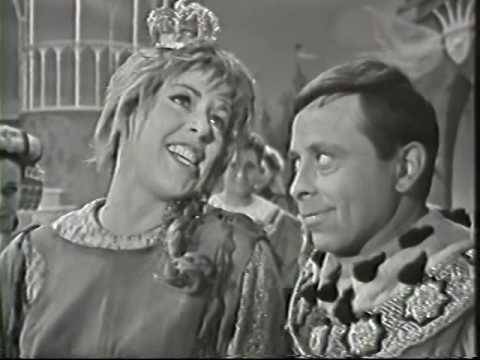
In this 1964 TV production Queen Aggravain(Jane White) seeks to prevent her son Prince Dauntless (Joseph Bova) from marrying by placing impossible tests on the pribncesses,and she is especially infuriated when an uncouth swamp princess ,Princess Winifred (Carol Burnett ) hits it off with the prince and secretly plans to test her sensitivity by placing a pea under 20 mattresses
SO this musical which premiered in 1959 is kind of as big deal.It was an early example of fairy tale parody and was the big break of comedy megastar Carol Burnett .My experience with the musical has really only been the 2005 TV movie (Which still had Burnett but as the evil queen ),and I was delighted to find there were two previous TV productions starring Carol Burnett.I debated whether to watch this 54 production or the 72 production ,but I went with this cause it had most of the original cast
SO while I enjoyed the 2005 TV movie........THis is so much better.I thought this was so funny.Joseph Bova is a fun meek prince with an adorable romance with Winifred ,its fun to see a young Elliot Gould as the jester ,and Jack Gilford is a delight as the mute king .Jane White is hamtastic as the villainous queen ,a posessibve woman obsessed with getting everything her way
The best part is just the comedic powerhouse that is Carol Burnett ,who just embodies the ides of a non traditional princeess,with somed great comedic moments and especially great songs,especially her intro song Shy which is one of the funniest songs in Musical Theater
If I had a complaint its that its too short,cutting one of my favorite song Happily Ever After ,but the pacing is pretty quick
Overall I had such a fun time watching this highly reccomended
@the-blue-fairie @princesssarisa @ariel-seagull-wings @themousefromfantasyland @scarletblumburtonofeastlondon @autistic-prince-cinderella @theancientvaleofsoulmaking @filmcityworld1 @amalthea9 @angelixgutz
6 notes
·
View notes
Text
below is an essay i wrote in sixth form where i explore the common tropes of female characters in horror movies and the changes seen in modern cinema. whilst it doesn’t correlate directly to cinematography or editing, it’s still a piece that i often come back to and so i’m posting it on this blog so i can refer back to it throughout my degree. feel free to read!
How has the portrayal of women in horror evolved in the last century?
Since the beginning of cinema, horror has been widely considered the most boundary-breaking and daring genre in film, given both the hyperbolic violence and graphic content that horror films contain, and the often even more horrifying messages that are subliminally hidden within the story. Horror is defined as 'a combination of the primal emotions of fear and disgust, with some element of the uncanny’ (Lovecraft, 1945). It is undeniable that women have, ever since horror began, taken a central role in not only the genre but its evolution and growth into one of the most popular film categories, and have played pivotal roles both in front and behind the camera. However, the importance of accurate female portrayal in film has grown rapidly within every genre, with feminism becoming more and more mainstream and society becoming more and more demanding for equality and fair representation every day
A 2017 study by CivicScience found that 60 percent of horror fans are women, and a 2018 study by Movio found that people of colour are 58 percent of movie going audiences for paranormal horror movies and 49 percent of ticket-buyers for sci-fi horror films. Despite this, however, women take up a significantly smaller amount of space behind the camera than they do sat in front of the screen; According to the study, titled ‘It’s a Man’s (Celluloid) World’, only 35 per cent of films included 10 or more female speaking roles, but a staggering 82 per cent of movies had at least 10 male characters with speaking roles. Furthermore, the increasing popularity of the #MeToo movement has shed a light on Hollywood’s de-sensitivity towards sexual violence both on screen and behind the scenes. So what does this mean for a genre that has, for the last 200 years, violated and mistreated its women for the likes of misogynistic male audiences? My aim for this study is to explore the historic portrayal of women in horror, examining the way in which society has both influenced and been influenced by the way we watch women on screen. Inspired by the study of Carol J. Clover and her thesis on Gender in the Modern Horror Film ‘Men, Women and Chainsaws’, I am interested in analysing the change in cinematic representation of feminine horror and will look at the common female archetypes and tropes we see in horror films and what they represent. I will also analyse 3 horror films with predominant female leads or reoccurring characters over the last century- Psycho (1960), Scream (1996) and Midsommar (2019)- in order to compare the way in which their characters have changed and been altered by societal progression. I believe that this investigation will help me gain a wider understanding of the portrayal of women in horror and predict how the film industry will evolve further in the future to accommodate and depict femininity accurately on the big screen.
History
In order to understand the change in portrayal, we must first analyse and understand the problems within the typical female characters that commonly feature in horror. When deconstructing horror down to its foundations, I have found five predominant types of horrific woman: The Girl Next Door, The Mother, The Vixen, The Femme Fatale, and The Crazy Woman. These characters can be found in every horror film, and embody the way women are viewed and have been viewed in society over the past century and beyond.
The Girl Next Door is presented as intelligent, shy, kind, pure and virginal. She represents the societal ideal of women; to be seen and not heard, to absorb the negativity and anger of men, and to promote innocence and reject sexuality, although she is often desired by men for her silence and submission. An example of The Girl Next Door is Nancy Thompson from A Nightmare on Elm Street (1984), who is characterised by her sweet, virginal persona and is terrorised by killer Freddy Krueger. The Girl Next Door not only encapsulates the ‘ideal woman’ trope but also plays into the expectations of women from a religious perspective. Western faith and Christianity have always been featured in horror, constantly teaching audiences important lessons about the power of God: Crucifixes wound vampires and repel evil spirits, premarital sex and blasphemy are punishable by death, and that virgins can be mothers if God deems them fit. This trope has perhaps not changed attitudes towards women in society, but it has certainly perpetuated ideas about women that have always lingered in our minds. According to Rockoff (2002), “One of the most enduring images of the slasher film is that of the beautiful heroine screaming with fear- as the killer rapidly approaches.” What this shows us is that our society thrives on the suffering of innocent women; we condemn rape and sexual violence and reject domestic violence and battery, and then watch female protagonists or ‘scream queens’ be subjected to all of the above by troubled men who apparently deserve the right to play god. Weaver & Tamborini found in a 1996 study that “watching horror films is said to offer viewers a socially sanctioned opportunity to perform behaviours consistent with traditional gender stereotypes” and that “males exposed to a sexually violent slasher film increased their acceptance of beliefs that some violence against women is justified and that it may have positive consequences.”
The Mother is a character that similarly represents preconceived notions of women in society, except with a more ominous, hyperbolic characterisation. She is obsessive and controlling and lives through her child and is responsible for any carnage that ensues all because she raised them ‘wrong’. The trope is arguably one of the most hypocritical stereotypes: women are constantly pressured to have children and have maternal values and are then demonised- their compassion becomes their weakness. The Mother raises un-ladylike daughters and emotionally and sexually repressed sons, who often end up either the victim or the villain of the film. In pop culture, men have always blamed their mothers or their unconventional upbringings for their behaviour, such as infamous serial killer Ed Kemper, who ‘bludgeoned [his mother] with a claw hammer and slit her throat with a penknife. He then decapitated her and engaged in irrumatio with her severed head, then used it as a dartboard. Kemper stated that he "put [her head] on a shelf and screamed at it for an hour ... threw darts at it," and, ultimately, "smashed her face in." He also cut out her tongue and larynx and put them in the garbage disposal.’ In our culture, we punish The Mother for every aspect of her existence: being too strict, being too lenient, indulging in romance, being single, being emotionally suffocating, being emotionally distant. A prime example of The Mother in horror fiction is Margaret White in Carrie (1976), a God-fearing, volatile woman who raises Carrie without the aid of a husband. Margaret is presented as an emotionally and physically abusive mother, who punishes Carrie for discussing female anatomy and claims that Carrie’s menstrual trauma is a punishment from God, as retribution for Eve’s original sin. Here, we are reminded of the power of religion regarding motherhood, as Margaret externalizes the societal pressures of motherhood and inflicts her religious trauma on Carrie, who ultimately murders her mother by pinning her to the wall with knives in the formation of a crucifix (Carrie, 2013). Perhaps a more satirical example of The Mother is in Darron Aronofsky’s Mother! (2017) where Mother is portrayed as hysterical for wanting to protect her infant child from the hands of a violent mob, arguably an homage to Rosemary’s Baby (1968). Horror often promotes the demonization of motherhood and refuses to acknowledge the impact of the father on the emotional development of the child.
The Vixen is potentially one of the most iconic and common tropes seen in horror, throughout every era. The purpose of The Vixen is to represent every bad aspect of society: She drinks alcohol, enjoys sex, and has fun- she is the antithesis of The Girl Next Door. The Vixen can be easily identified, as she is the first to die in almost every instance. Actresses playing this role are often exploited and are responsible for the majority of gratuitous nude scenes that are infamous in the horror genre. E. Ann Kaplan theorized the concept of ‘The Male Gaze’, which claims that ‘within the film text itself, men gaze at women, who become objects of the gaze; the spectator, in turn, is made to identify with this male gaze, and to objectify the woman on the screen; and the camera’s original ‘gaze’ comes into play and the very act of filming.’ This theory perfectly explains the trope of The Vixen, as she is essentially any man’s ‘perfect’ woman, whilst simultaneously being punished for celebrating her womanhood. It is clear that men are allowed to sexualise this character freely, but for her to behave sexually or own her sexuality is not allowed. The narrative of horror teaches us that sexuality is a flaw when displayed in female characters, but that male characters can flaunt their sexual power without consequence; it is even transmitted to audiences subliminally through phallic imagery like stabbing and impaling- the most common deaths for Vixens. Tatum Riley from Scream (1996) is a well-known- and arguably satirical- depiction of The Vixen, as she contrasts her best friend Sidney’s innocent, academic attitude and instead indulges in underage drinking, sex, and overall ‘unladylike’ behaviour, which ultimately justifies her brutal murder. This links back to the patriarchal lens that we consume horror through and reflects the misogyny of filmmakers in our culture: Playwright Sardou said “Torture the women!”
The Femme Fatale represents a shift in the attitudes of male filmmakers and film watchers, as for the first time, women were given a role in horror that didn’t reduce them to their sexual exploits or patriarchal value. Women began to take on the role of the villain, displaying for the first time, the capability of women’s intellect and their ability to not only avoid victimhood but also to inflict it upon others. The Femme Fatale (French for ‘lethal woman’) is conniving, manipulative and seductive by nature. Mary Ann Doane, in her 1991 book Femme Fatales, described the trope as ‘a stock character of a mysterious, beautiful, and seductive woman whose charms ensnare her lovers, often leading them into compromising, deadly traps. Femme Fatales are typically villainous, or at least morally ambiguous, and always associated with a sense of mystification, and unease.’ In the early 20th Century, American movies featured Femme Fatales, or vamps- a reference to The Vampire, Philip Burne-Jones's 1897 painting, and Rudyard Kipling's later 1897 poem, and the 1909 play and 1915 film A Fool There Was- as well as in films noir where female mobsters from the Italian-American and Russian Mafias were portrayed as Femme Fatales. In more recent popular culture, an iconic Femme Fatale is Catherine Tramell from Basic Instinct (1992), who uses her beauty and charm to deceive the male characters into assuming her innocence. This trope changed the DNA of horror in many ways, however at its core it still reflects sexist attitudes: only beautiful women with sex appeal had the power to control men, whereas conventionally unattractive women did not possess this skill, reinforcing the idea that a woman’s worth is only determined by how aesthetically pleasing she is to men. As well as perpetuating the objectification of women, the Femme Fatale also villainises women for their sexuality and associates female intelligence and power with danger and sin. Despite this, ‘The femme fatale, a quasi-eternal figure of female transgression and retributory violence, has gradually entered popular culture's symbolic lexicon as representative of mainstream feminism and postmodern femininity.’ (Dennon, 2017).
The final trope is the Crazy Woman, which is often an extension of another trope, such as the Girl Next Door or the Femme Fatale. The Crazy Woman is usually average in most ways; She has average looks, works an average job, lives an average life. Her descent into madness is usually catalysed by intense social expectations or supernatural forces, like demonic possession (The Exorcist, 1973). The Crazy Woman can also become mad due to a lack of support or belief when suffering from unbelievable situations, like being terrorised by a killer (The Invisible Man, 2020). A modern example of the Crazy Woman is Nina Sayers from Black Swan (2010), whose characterisation represents the traditional feminine conflict: Forced to play both the white swan, a symbol of purity and innocence, and the black swan, a symbol of promiscuity and power, to perfection, she becomes consumed by the desire to be perfect, ultimately leading to her inadvertent suicide. The Crazy Woman was originally a succubus for the devil, or an obsessed ex-girlfriend, but in more recent films she acts as a critique of society and the way in which women absorb cruelty and mistreatment until they inevitably reach their limit. Whilst male characters like Jack Torrence from The Shining (1980) can embrace madness without consequence, female characters are punished by male audiences for their weakness and decreased attractiveness- though interestingly, the Crazy Woman’s madness always derives from men. ‘In horror, the Crazy Woman trope usually plays out the same way. A woman experiences a supernatural occurrence alone. She's then confronted with two options. One, she hides it from the male presence -- usually a husband or romantic partner -- for fear he'll think she's "crazy." Two, she confides in the male, only for him to confirm that she must be crazy. In the latter scenario, the man typically remains in supernatural denial until the film's conclusion when he experiences it first-hand -- and it's usually too late.’ (White, 2021). However, there is an exception to this rule, resulting in the birth of the Final Girl. This sub trope refers to the girl that lives, beating the killer and reclaiming her power. Clover (1992) suggests that ‘it is necessary for this surviving character to be female because she must experience abject terror, and many viewers would reject a film that showed abject terror on the part of a male. The terror has a purpose, in that the female, if she survives, is "purged" of undesirable characteristics, such as relentless pursuit of personal pleasure.’
Whilst these tropes reflect the issues within our patriarchal society, they also allow the horror genre to develop and pave the way for modern filmmakers who want to turn a feminist lens on previously oppressive representation. As the film industry grows, I am interested to see how the portrayal of women has evolved, and whether this reflects a shift in our society’s attitudes towards women.
Analysis
Once these tropes are taken into consideration, we can then have a better understanding of how women in horror have evolved, as it is easier to identify these roles and how they reflect the changing societies of which they represent. The first horror film I will be analysing is Psycho (1960) dir. Alfred Hitchcock. I have chosen to analyse this film, as it is widely considered to be a triumph within the horror and film industry and is essentially a microcosm of everything that late 50s and early 60s horror thrillers represented. ‘With its shocking bursts of violence and provocative sexual explicitness, Psycho tested the strict censorship boundaries of the day as well as audiences' mettle’ (Robb, 2010), suggesting that in today’s climate, the contents of this film may not be considered as iconic, and instead may highlight the problematic nature of women’s treatment in horror cinema in the past.
The story begins with Marion Crane, a young woman who was raised by a prostitute, married to a rapist, and carries the burden and guilt of the murder of one of her mother’s customers. Marion is constantly punished for every aspect of her womanhood, as her body is a commodity used to please her violent spouse and, in turn, also satisfy an audience of misogynists. Marion’s role as a Vixen not only causes her downfall but also justifies it. When Marion is violently stabbed in the shower of her room in Bates Motel, ‘a demarcation line in film history,’ the audience is taught not to pity her- she is an adulterer, a liar, a thief. In Psycho, we are subliminally reminded of a troubling Hitchcock paradox: no amount of emotional backstory or childhood trauma can justify the minor faults of a woman, but a man can murder, rape and mutilate, and be let off on the basis of a difficult upbringing or bad day. Clover (1992) says ‘Our relationship with Marion’s body in Psycho halts abruptly at the moment of its greatest intensity (slashing, ripping, tearing). The considerable remainder of the film distributes our bruised sympathies among several lesser figures, male and female, in such a way and at such length as to ameliorate the Marion experience and leave us, in the end, more or less recuperated in our presumed masculinity.’ Hitchcock’s sexualisation of Marion in her final moments further amplifies the overt objectification of women in horror, and suggests that male audiences enjoy watching the carnage unfold. As horror director Dario Argento said, ‘I like women, especially beautiful ones. If they have a good face and figure, I would much prefer to watch them being murdered than an ugly girl or a man.’
As the film progresses following the murder of Marion, the character of Norman Bates begins to develop: Bates kills sexually attractive women to appease his ‘mother’ Norma Bates, who lives within his psyche and controls his homicidal impulses. We learn more about this dynamic when Marion’s lover Sam Loomis and her sister Lila Crane investigate her disappearance, where Sam learns that Norma Bates has been dead for 10 years, despite Norman claiming to run the motel with her. Soon after this revelation, Lila discovers Norma Bates’ mummified body in the motel and is caught by Norman, dressed in his mother’s clothes, and donning a grey wig. Here, Hitchcock explores the extent of Norman’s sexual repression: we later discover that Norman murdered his mother and her lover and has killed other women like Marion who threaten his sexuality. However, what is interesting to note is that we as an audience still inadvertently blame the mother for Bates’ degeneracy, justifying his homicidal urges as simply a result of ‘the mother half of his mind’. The Mother trope is evident in Psycho, and Hitchcock uses it to teach his audience that women are both the cause of male insecurity and the victims of it. Bates’ gender conflict and cross-dressing further imply this theory, as Hitchcock suggests that femininity and womanhood are threatening and dangerous, and something to be devalued and destroyed. This comes as no shock though, as Hitchcock said on the set of The Birds (1963) that ‘The trouble is that we don’t torture women enough.’ Whilst Psycho will forever be a horror classic and the blueprint for countless others, it is also undoubtedly a disappointing reflection of 1960s society, and the treatment of women 60 years ago.
Scream (1996) dir. Wes Craven indirectly challenges the attitudes and ideas towards women, that were presented by Alfred Hitchcock and represents a slow shift in the view of gender in horror. Craven is notorious for his impact on the horror genre, directing cult classics like A Nightmare on Elm Street franchise (1984–2010), The Hills Have Eyes (1977) and the first four films in the Scream franchise (1996–2011). Despite citing Hitchcock as one of his many influences, Craven fails to reproduce the same sexist undertones that exist within films like The Birds (1963) and Psycho (1960). Instead, Craven uses his films to critique other aspects of society, particularly the power of the Church and religion, and dysfunctional family units. Craven stated: ‘The family is the best microcosm to work with… It’s very much where most of our strong emotions or gut feelings come from… I grew up in a white working-class family that was very religious. There was an enormous amount of secrecy in the general commerce of our getting along… If there was an argument, it was immediately denied. If there was a feeling, it was repressed… I began to see that as a nation we were doing the same things.’
However, there are still aspects of Scream (1996) that are patriarchal, such as the importance placed on Sidney Prescott’s virginity, and the stereotypical gender roles of the Girl Next Door and the Vixen. Sidney’s abstinence can arguably be identified as a motive for her boyfriend Billy Loomis and his best friend Stu Marcher’s murder spree under the alias of Ghostface. This also directly contrasts Sidney’s mother Maureen, who was raped and murdered a year prior to the killing spree by her lover Cotton Weary. Later in the film, however, we learn that Billy was the real culprit, and wanted to punish Maureen for having an affair with his father and causing his mother to leave him. This again displays the demonization of motherhood and even hints at Freud’s oedipal theory that applies to both Billy Loomis and Norman Bates (Psycho, 1960). Billy’s hypocritical attitude that Sidney and her mother both deserved to die for existing on opposite ends of a sexual spectrum highlights the patriarchal injustice within society, and the role of women as sex objects exists beyond just the Prescotts; In the film’s opening sequence, Casey Becker lies about having a boyfriend and is murdered by Ghostface for rejecting his advances.
Despite this, Craven constantly reminds his audience that Scream (1996) is a satire. ‘The film combines black comedy and "whodunit" mystery with the violence of the slasher genre to satirize the clichés of the horror movie genre. Scream was considered unique at the time of its release for featuring characters who were aware of real-world horror films and openly discussed the clichés that the film attempted to subvert.’ A clear example of this is during a party scene, where Randy states that to survive a horror movie ‘You can never have sex’ and Tatum, cornered by the killer, says ‘No, please don't kill me, Mr. Ghostface. I want to be in the sequel.’
The final film I analysed was Midsommar (2019) dir. Ari Aster, which displays a clear change in the presentation of women in horror. Rather than have the Final Girl fight for her life or go mad from a lack of power and control over her life, Aster places protagonist Dani in a position of unfamiliar but deserved power and respect, a direct contrast from her life as a nagging girlfriend and silenced sister.
Following the murder-suicide of her bipolar sister and parents, Dani visits a Swedish festival with her boyfriend and his friends. However, the community is soon revealed to be a manipulative cult, who adopt Dani and crown her their ‘May Queen’. Aster explores both emotional and physical violence in Midsommar (2019), portraying the psychological torture of Dani and Christian’s relationship as so painful and traumatic that she seeks refuge and comfort in the arms of murderers. Gender is explored interestingly in the dynamics within the film, as the male characters often engage in arguments and rivalries that are stereotypically ‘feminine’, whilst the female characters are bonded by sisterhood and the expression of pain and suffering. Whilst it could be considered patriarchal for the women to bond through trauma, it is refreshing compared to the typical competition that female characters find themselves in. The film also features nudity of both sexes, the most prominent example being a mating ritual that takes place in the second act. However, the decision to include this scene stems from Aster’s desire to connote fear rather than eroticism: Jack Reynor (Christian) said for Forbes that ‘I'm a big cinephile and I watch a lot of horror movies. I think that [Christian's presentation] in a sexual way have been generally reserved for females. I have an opportunity to put myself in this person's shoes as they feel this exposure and vulnerability and this awful fear.’ Furthermore, Aster’s presentation of female rage, also seen in his 2018 film Hereditary, contrasts the weakness of women in horror in the past, as he allows his protagonists to be empowered by tragedy, rather than hindered- suggesting that a descent into madness is almost inevitable in the context of patriarchy. Dani’s power reaches its peak in the final act of Midsommar, when she selects Christian to be burned alive during the cult’s closing ritual, a decision we as an audience ultimately justify. This is what the new wave of ‘feminist’ horror tells us- that in the collective subconscious of all women are psychic wounds so deep and raw that even to brush against them is to become a conduit for their primal violence.
Conclusion
Following this analysis, I believe it is clear that horror has evolved, as well as the presentation of women within it. Whilst cult classics such as Psycho (1960) and Scream (1996) will forever be considered cinematic triumphs, the patriarchal attitudes of which they portray have since become less socially acceptable, and we now move in the direction of ‘feminist’ horror, defined as ‘[showing] the complexity of humankind, from the ugliness of our flaws to the beauty of our compassion’ (Gredner, 2019). However, some may argue that horror has begun moving in a direction that exceeds equality and the dismantling of patriarchal ideology. In recent years, films like Gone Girl (2014) and The Love Witch (2016) have introduced juxtaposing gender roles, appointing male characters as the naïve, helpless victims and repopularising the Femme Fatale. Even in Midsommar (2019), the growing evilness of Dani could be considered misandry; However, these characters are only mirroring the behaviours of the evil men that came before them. ‘True equality is admitting that women can be evil too.’ (Cosslett, 2014).
Despite this, there are still many aspects of horror that still cater to misogynistic male audiences. Gratuitous nudity is still commonly found in horror films, and according to a 2018 study by Women and Hollywood, females were far more likely than their male counterparts in 2018 to be shown in sexually revealing attire (29.2% vs. 7.4%) and with some nudity (27.3% vs. 8.5%). Girls/women were also more likely than boys/men to be referenced as attractive by other characters (10.2% vs. 2.7%). In addition, there is still an undeniable amount of sexism behind the camera: Scream (1996) was, after all, a Weinstein production. Until women in horror are treated equally within the industry, how can they ever be portrayed equally on screen?
To summarise, there have been many improvements in the portrayal of women in horror over the last century, and there will be many more within the upcoming years. It is clear that changes still need to be made, and I believe that these must begin behind the scenes.
Firstly, the inequality amongst male and female filmmakers is still a big issue within the film industry, with sexual assault and harassment disproportionately affecting female crewmembers and actresses, and 94% of women employed in the American film industry claiming to have experienced sexual harassment or assault. I believe that, following the MeToo movement, we are already witnessing more awareness being spread to decrease this sexual violence and make the industry a more welcoming and liberating space for female creatives in the name of political correctness, if not for a genuine desire for gender equality.
Furthermore, I believe that female storytellers will improve the portrayal of women in horror, as they provide audiences with a new perspective on terror and fear that has perhaps been shunned or silenced. In 2018, Jason Blum, head of horror studio Blumhouse Productions, sparked outrage when he blamed his company’s non-existent track record with women on... the women themselves. ‘There are not a lot of female directors, and even less who are inclined to do horror.’ However, female filmmakers like Karyn Kusama, Julia Ducournau and Mary Harron have defied this statement, and will influence many other women in horror to redefine the genre. Overall, I am hopeful for the future of horror, and believe that the genre will continue to grow and explore different avenues of the human experience, without being restricted by the shackles of patriarchy.
Bibliography
Phillips, H., 1973. Supernatural Horror in Literature. Courier Corporation.
https://books.google.com.vc/books?id=Bu7D-gXxOL8C&printsec=frontcover&source=gbs_book_other_versions_r&cad=3#v=onepage&q&f=false
CivicScience. 2021. 13 Insights about Horror Movie Fans - CivicScience. https://civicscience.com/horror-movie-fan-facts/
The Independent. 2021. Representation of women in films is getting worse, new study reveals | The Independent | The Independent.
https://www.independent.co.uk/arts-entertainment/films/news/women-film-representation-female-protagonists-2018-mans-celluloid-world-study-a8786616.html
Movio Blog. 2021. Unmasking Horror Moviegoing Audiences | Movio Blog. https://movio.co/blog/unmasking-horror-moviegoing-audiences/
Lauzen, D., 2020. It’s a Man’s (Celluloid) World. [online] Womenintvfilm.sdsu.edu. Available at: <https://womenintvfilm.sdsu.edu/wp-content/uploads/2020/01/2019_Its_a_Mans_Celluloid_World_Report_REV.pdf> [Accessed 8 October 2021].
https://womenintvfilm.sdsu.edu/wp-content/uploads/2020/01/2019_Its_a_Mans_Celluloid_World_Report_REV.pdf
Brewer, C. (2009). LSU Digital Commons The stereotypic portrayal of women in slasher films: then versus now. [online] Available at: https://digitalcommons.lsu.edu/cgi/viewcontent.cgi?article=1055&context=gradschool_theses
Weaver, J. B. III, & Tamborini, R. C. (Eds.). (1996). Horror films: Current research on audience preferences and reactions. Lawrence Erlbaum Associates, Inc.
https://www.taylorfrancis.com/books/mono/10.4324/9780203812129/horror-films-james-weaver-ron-tamborini
von Beroldingen, Marj (March 1974). ""I Was the Hunter and They Were the Victims": Interview with Edmund Kemper". Front Page Detective. Retrieved October 4, 2019 – via Truecrime.net.
Kaplan, E. Ann (2010). Is the gaze male? In Marc Furstenau (ed.), The Film Theory Reader: Debates and Arguments. Routledge.
http://seas3.elte.hu/coursematerial/GallCecilia/Kaplan_isthegazemale.pdf
Clover, C.J. (1997). Men, women and chainsaws : gender in the modern horror film. Princeton, N.J.: Princeton University.
http://assets.press.princeton.edu/chapters/i10479.pdf
Mary Ann Doane (1991). Femmes fatales : feminism, film theory, psychoanalysis. New York: Routledge.
https://www.routledge.com/Femmes-Fatales/Doane/p/book/9780415903202
Scholarworks@cwu, S. and Dennon, A. (2017). The Emergence of the Feminist Fatale in American Film Noir The Emergence of the Feminist Fatale in American Film Noir.
https://digitalcommons.cwu.edu/cgi/viewcontent.cgi?referer=&httpsredir=1&article=1646&context=etd
White, J., 2021. Horror Films' 'Crazy Woman' Trope Must Die. [online] CBR. Available at: <https://www.cbr.com/horror-films-should-stop-crazy-woman-trope/> [Accessed 8 October 2021].
https://www.cbr.com/horror-films-should-stop-crazy-woman-trope/
Robb, S., 2010. BBC News - How Psycho changed cinema. [online] News.bbc.co.uk. Available at: <http://news.bbc.co.uk/1/hi/magazine/8593508.stm> [Accessed 8 October 2021].
http://news.bbc.co.uk/1/hi/magazine/8593508.stm
Power, E., 2001. Dario Argento. [online] The Irish Times. Available at: <https://www.irishtimes.com/news/dario-argento-1.318986> [Accessed 9 October 2021].
https://www.irishtimes.com/news/dario-argento-1.318986
Lopez, K., 2019. A Film Under the Influence: Gender, Homage And 'Midsommar'. [online] Forbes. Available at: <https://www.forbes.com/sites/kristenlopez/2019/07/01/a-film-under-the-influence-gender-homage-and-midsommar/?sh=1c6dc94f77ee> [Accessed 10 October 2021].
https://www.forbes.com/sites/kristenlopez/2019/07/01/a-film-under-the-influence-gender-homage-and-midsommar/?sh=1c6dc94f77ee
Cosslett, R., 2014. Female villains and false accusations: a feminist defence of Gone Girl. [online] New Statesman. Available at: <https://www.newstatesman.com/culture/2014/10/female-villains-and-false-accusations-feminist-defence-gone-girl> [Accessed 10 October 2021].
https://www.newstatesman.com/culture/2014/10/female-villains-and-false-accusations-feminist-defence-gone-girl
2018 Statistics | Women and Hollywood . 2021. 2018 Statistics | Women and Hollywood . [ONLINE] Available at: https://womenandhollywood.com/resources/statistics/2018-statistics/. [Accessed 10 October 2021].
https://womenandhollywood.com/resources/statistics/2018-statistics/
Katie Rosseinsky. 2021. Meet the new generation of female filmmakers changing the face of horror | London Evening Standard | Evening Standard. [ONLINE] Available at: https://www.standard.co.uk/culture/film/horror-films-female-directors-shirley-saint-maud-a4572726.html. [Accessed 10 October 2021].
https://www.standard.co.uk/culture/film/horror-films-female-directors-shirley-saint-maud-a4572726.html
5 notes
·
View notes
Text
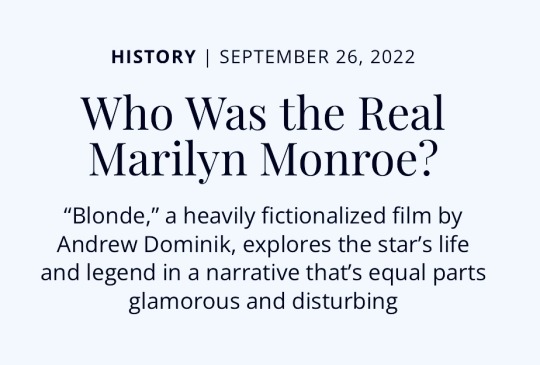
Marilyn Monroe, then known as Norma Jeane Mortenson, poses for a photo shoot on 1946.


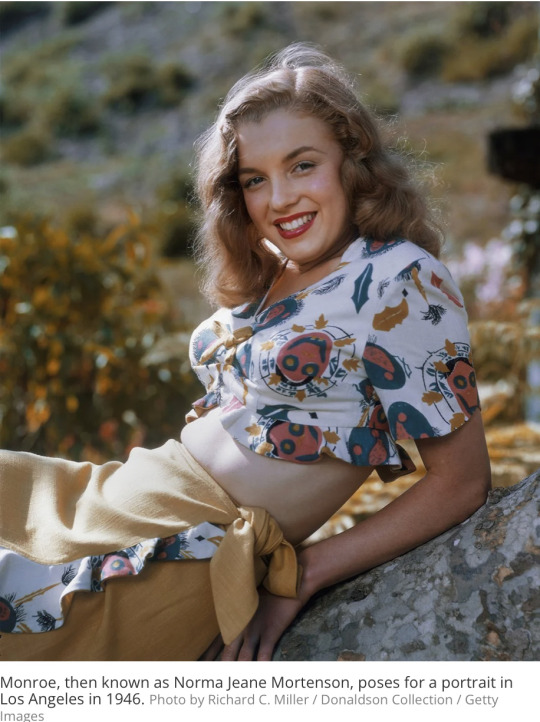
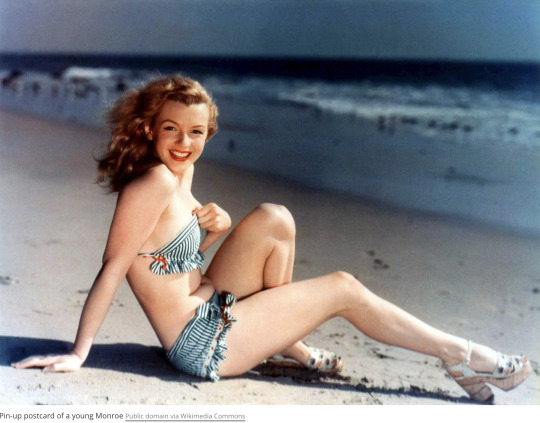



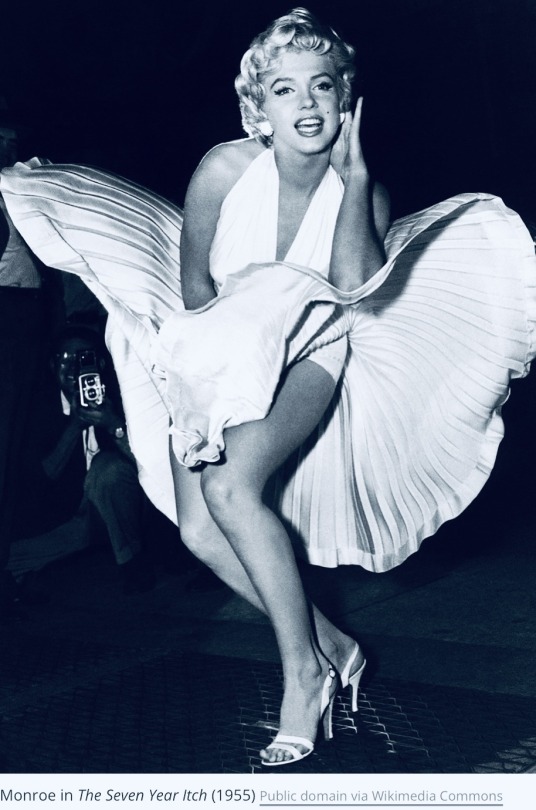

“Marilyn Monroe’s final interview is a heartbreaker. Published in Life magazine on August 3, 1962—just a day before the actress died of a barbiturate overdose at age 36—it found Monroe reflecting on her celebrity status, alternatively thoughtful, frank and witty. “When you’re famous you kind of run into human nature in a raw kind of way,” she observed. “It stirs up envy, fame does. People you run into feel that, well, who is she—who is she, who does she think she is, Marilyn Monroe?” That same question—who was the real Monroe?—has sparked debate among cinema scholars, cultural critics, historians, novelists, filmmakers and the general public for decades. Was “Marilyn,” the personality and persona brought to life by the star’s younger self, Norma Jeane Mortenson, a real person? Or was she simply a manufactured image?
Andrew Dominik’s new film Blonde, starring Ana de Armas as Monroe, adds another layer to this age-old question in a fictionalized narrative of the actress’ life that’s equal parts glamorous and disturbing. Based on Joyce Carol Oates’ 2000 novel of the same name, the movie imagines a Monroe torn between two disparate selves. As the star explains in the film’s trailer, her stage persona isn’t real. “When I come out of my dressing room, I’m Norma Jeane. I’m still her when the camera’s rolling,” she pleads, haunted and exhausted. “Marilyn Monroe only exists on the screen.” Film historian Michelle Vogel, author of Marilyn Monroe: Her Films, Her Life, echoes this view. “I don’t think there was a ‘real’ Marilyn Monroe,” says Vogel in an interview. “She was a character and a persona to be played, both on and off the screen. At the heart of it all, Marilyn Monroe was still Norma Jeane. … When she acted a part, it was Norma Jeane, playing Marilyn Monroe, playing said role. Not easy.”
Cultural historian Sarah Churchwell, meanwhile, contends in The Many Lives of Marilyn Monroe that “Monroe is not best understood as only an image, or as an ‘artificial creation of a woman.’ … Something that is not natural can still be real: It has been made. One of the questions the stories about Marilyn’s life beg, therefore, is how much any of us is natural, whether any identity is not made.” Here’s what you need to know about the true history behind Blonde—and the woman, actress and image that was Monroe—ahead of the film’s release on Netflix on September 28.n
IS BLOND BASED ON A TRUE STORY ?!
Very loosely. Though the 166-minute film has the sweeping scope of a biopic, covering Monroe’s life from childhood to her ascent to stardom to her death, it does not purport to be historically accurate. Instead, like the fictionalized Oates novel it’s based on, Blonde seeks to be spiritually faithful to the image Monroe embodied. (As literary critic Elaine Showalter wrote for the New Yorker in 2020, Oates—and, by extension, director-screenwriter Dominik’s script—“plays with, rearranges and invents the details of Monroe’s life in order to achieve a deeper poetic and spiritual truth.”). Despite the liberties taken by Blonde, Dominik sees his film as an attempt to portray what he deems the “real” Monroe. “I’m trying to relate to someone else’s life experiences in an authentic way,” Dominik tells Vanity Fair. “I wanted to detail her childhood trauma and then show her adult life through the lens of that trauma. If you look closely at Marilyn Monroe, she’s the most visible woman in the world, but she’s completely unseen.”
For Blonde’s lead actress, de Armas of Knives Out fame, the role was an emotional and spiritual revelation. “I truly believe that [Marilyn] was very close to us, she was with us,” de Armas tells Deadline. “… She was all I thought about, she was all I dreamed about, she was all I could talk about.” The actress adds, “I knew I had to let myself open and go to places that I knew were going to be uncomfortable, dark and vulnerable. That’s where I found the connection with this person.” So, who was Marilyn Monroe? Once upon a time, she was a real person, a childhood dream come true—the dream of a little girl named Norma Jeane Mortenson.
WHO WAS NORMA JEANE MORTENSON ?!
Born in Los Angeles on June 1, 1926, the future Monroe grew up far from the trappings of luxury and fame she’d one day enjoy. Her mother, Gladys Pearl Baker, was a film cutter who struggled to make ends meet. Her father was nowhere to be found. Baker didn’t have the money to take care of Monroe, so she shuttled the child between orphanages and foster homes. After Baker was diagnosed with paranoid schizophrenia and institutionalized in 1934, family friend Grace Goddard took charge of Monroe’s upbringing. “You could buy a sackful of old bread … for 25 cents,” Monroe recalled in her unfinished autobiography. “Aunt Grace and I would stand in line for hours. … When I looked up at her, she would grin at me and say, ‘Don’t worry, Norma Jeane. You’re going to be a beautiful girl when you grow up.’”
Monroe’s hardships persisted as she came of age. In one foster home, she was sexually abused, fondled by a lodger at just 8 years old. At school, she was the target of other children’s hurtful jests. “I was tall for my age and scrawny and my hair was short and rather thin and scraggly,” she said in a May 1952 interview. “The boys used to yell ‘Norma Jeane—string bean!’ and they thought it was so funny that I wanted to be an actress. … Somehow they thought I looked like a boy, I was so straight up and down.” The glamour of the silver screen helped Monroe get through it all. The idyllic films of Golden Age Hollywood inspired her childhood fantasies, giving her hope that a better, brighter future lay ahead. She loved movies, watching them for long stretches while her guardians were at work. “In junior high, I was completely movie-struck,” she said in a 1951 interview. “I used to see movies I liked three or four times when I could afford it.” She fantasized that the “King of Hollywood” himself, Clark Gable, was her missing father, and she aspired to be just like the blonde bombshell Jean Harlow when she grew up.
At age 16, Monroe married 21-year-old Jim Dougherty to avoid being placed back in the orphanage system. In 1944, as the Second World War raged, Dougherty enlisted in the Merchant Marine, while his wife went to work at a munitions factory. One day, a photographer came by the factory and was struck by the now-18-year-old’s beauty. “You’re a real morale booster,” Monroe recalled him saying. “I’m going to take your picture for the boys in the Army to keep their morale high.” This portrait (photo #3) marked Monroe’s discovery. Her marriage fell apart as she pursued a career in modeling, but she was determined to make a name for herself. Monroe’s wholesome look, completed by her winning smile and large bust, made her a natural for pin-ups. She continuously strove to improve her craft, honing her ability to work the camera through modeling classes and study. She also bleached her curly, reddish-brown hair, becoming a platinum blonde. “I wouldn’t settle for second best,” Monroe later said. “I would take home photographs of myself to study how I looked and if I could improve myself posing in front of a mirror.” Just as importantly, she learned how to charm others. “She made everyone she talked to feel as if he were the only one in the world,” recounted modeling agent Emmeline Snively. In 1946, 20th Century Fox took notice of this up-and-coming model and offered her a screen test. With it, Norma Jeane Mortenson took another key step toward her reinvention as Marilyn Monroe, a new persona that was everything her younger self had aspired to be: a movie star, beautiful, beloved and talented.
WHO WAS MARILYN MONROE ?!
Monroe’s initial contract with 20th Century Fox fell through, as did a follow-up gig with Columbia, but through it all, she kept striving to transform herself into the person she wanted to be. “I knew how third-rate I was,” she wrote in her memoirs. “I could actually feel my lack of talent, as if it were cheap clothes I was wearing inside. But, my god, how I wanted to learn, to change, to improve.” Changing her name to Marilyn Monroe—first as a screen name, then as her legal name in 1956—was but one part of her larger transformation. Living out of suitcases, she honed her craft and supported herself through modeling. Narratives of Monroe’s life, whether they’re based in fact or fiction, tend to focus on her trauma at the expense of her hard work and dedication. The myths surrounding her life have obscured what originally helped make her famous: her craft as an actress. It wasn’t easy to make it big as an actress in 1950s Hollywood. At the time, the film industry was dominated by the “studio system,” an arrangement through which the “Big Five” studios—Metro-Goldwyn-Mayer, Warner Brothers, Paramount, 20th Century Fox and RKO—monopolized movie production, distribution and exhibition. These male-dominated companies quashed the independent studios where women actors, directors and producers had previously found success. Still, Monroe prevailed. Her natural beauty helped her get through the door, but it was her hard work that cemented her rise to superstardom. “She had a drive to better herself by reading books on psychology, philosophy, poetry, art, drama, you name it,” says Vogel. “She studied at the prestigious Actors Studio in New York, with Lee Strasberg, because she had the desire to be a drama student, even after she was already a famous Hollywood actress. She was a trailblazer, and in many ways a feminist before the term was really known or understood.”
Rehired by 20th Century Fox, Monroe quickly became the studio’s most marketable star. After appearing as a tragic femme fatale in Niagara (1953), she took the lead in a series of films that established her “dumb blonde” persona: classics like How to Marry a Millionaire (1953), The Seven Year Itch (1955) and Some Like It Hot (1959). Her typical role, that of a ditzy charmer with impeccable comedic timing, differentiated her from contemporaries like Elizabeth Taylor, Doris Day and Audrey Hepburn, whose personas represented different kinds of femininity. Taylor’s temptresses competed with Monroe’s bubbly blondes, while Day’s wholesome “girl next door” persona evoked the appeal of the younger actress’ pin-up career. In contrast, Hepburn crafted an aristocratic image defined by her social refinement and style. Of course, Monroe was a dramatic force all her own. In Gentlemen Prefer Blondes (1953)—the quintessential Monroe film—she proved herself to be a triple-threat talent, dazzling her audiences with her singing and dancing as much as she made them laugh. “Diamonds Are a Girl’s Best Friend” is one of film’s most famous scenes for good reason: The “Blowtorch Blonde,” as she was dubbed by gossip columnist Hedda Hopper, absolutely steals the show.
“When Monroe is on screen, you watch her,” says film scholar Steven Cohan in an interview. “[T]here was something just physical about Monroe that exploded on film. … She just photographed luminously. So, there’s something very beautiful about [her] performance. And she had great timing—just watch her deliver lines.” Though Monroe is perhaps best known for her “dumb blonde” comedies, films like The Prince and the Showgirl (1957) and The Misfits (1961), a Western co-starring Clark Gable, testify to her range. That’s not to say her comedic roles lacked depth. Her glittering performance as showgirl Lorelei Lee in Gentlemen Prefer Blondes drew many of its laughs from the ambiguity of the character’s intelligence. “I can be smart when it’s important, but most men don’t like it,” says Lorelei in the film, heightening an already laugh-out-loud monologue. The star’s professional success is even more impressive in light of her personal struggles. Monroe was notoriously difficult to work with, as she was constantly late to shoots and often flubbed her lines. But she was no diva. “In reality, she had severe stage fright,” says Vogel. “She was a nervous wreck filming scenes, often breaking out into a rash or being physically ill at the thought of performing.” She abused barbiturates and amphetamines callously prescribed to her by doctors to cope with her trauma and anxiety.
Monroe’s career soared as her romantic life foundered, with two successive husbands failing to understand the woman she wanted to be. Baseball hero Joe DiMaggio balked at the sexuality of his wife’s public image. Playwright Arthur Miller was disgusted by her cult of celebrity. “Marilyn Monroe desperately wanted to be loved,” said film historian Karina Longworth in a 2017 episode of the “You Must Remember This” podcast. “But she never had the courage to figure out that she could choose who to love.” An old journal reveals the depth of Monroe’s grief: “I have always been deeply terrified to really be someone’s wife since I know from life one cannot love another, ever, really.” The fact that the actress was seemingly unable to carry a child to term (two pregnancies ended in miscarriages, while a third was ectopic) compounded these fears; in her view, her inability to bear children “damaged her femininity, her status as the representative of all women,” writes historian Lois Banner in Marilyn: The Passion and the Paradox. But this was Monroe’s private life. In public, she was a savvy political operator who could turn scandal into success and personalize her publicity. “The Hollywood studio system would often create fictitious back-stories and cover-up scandals for their stars, but Marilyn was different,” says Vogel. “She was open and honest about her dysfunctional childhood, so there was a very real, flawed, human element about her that made the public relate and fall in love with her.”
In 1953, when Playboy magazine published nude photos of Monroe without her consent, she kept her career intact by turning the images into free advertising. (Monroe hadn’t posed for Playboy; the photos dated to 1949, when the aspiring actress took part in a nude shoot with a pin-up photographer.) A May 1952 interview with the Chicago Tribune reveals how Monroe cannily responded to the situation: “When an interviewer recently asked her why she posed in the nude for calendars, she replied, ‘I was hungry.’ That’s a stopper if I ever heard one.” At the height of her fame, Monroe also took steps to fight back against the studio system, which enabled male executives to wield unprecedented control over the careers of its marquee stars. Forced to take roles she considered beneath her, the actress decided to break her restrictive contract with Fox in 1954 and start her own production company—Marilyn Monroe Productions—on the East Coast. Though Fox tried to blackball Monroe, she emerged victorious, renegotiating a studio contract that afforded her both a higher salary and creative control over her future roles. “She strove for equality and change to the Hollywood system, and [she] got it,” says Vogel.
WHY SHOULD WE STILL CARE ABOUT MARILYN MONROE ?!
Despite Monroe’s ascendance in the film industry, the final years of her life were marked with professional difficulties. Her last movie, The Misfits, was written by her third husband, Miller, as an allegory of their declining relationship. Playing a thinly veiled stand-in of herself was a particularly taxing experience for Monroe, and the movie turned out to be a commercial failure. Fox fired Monroe while she was on sick leave during the 1962 filming of Something’s Got to Give. Though she was rehired and on the cusp of a career resurgence at the time of her death, her final interview reveals her disillusionment with the whole affair: “I had asked if many friends had called up to rally round when she was fired by Fox,” wrote Life editor Richard Meryman. “There was silence, and sitting very straight, eyes wide and hurt, she had answered with a tiny ‘No.’” At the age of 36, Monroe was found dead in her Brentwood home. Was her death a suicide? An accident? A cover-up concocted by the Kennedys? A murder at the hands of her doctors? Sixty years later, the exact nature of her demise remains the subject of spirited debate. “[Marilyn’s death is] the gift that keeps on giving,” says Cohan, “because there’s no smoking gun. The autopsy continues to be raised, but it never answers any questions. … And the fact that she died in her [mid-30s] meant that she never grew old. … It’s another reason that she remains forever, forever young” in the public imagination.”
According to Vogel, “It’s as if we feel robbed of what could have been had Marilyn lived longer, so we cling on to everything she gave us, and repeatedly watch it, over and over and over again. … Maybe we’ll see or hear something new this time, or maybe it will be a comfortable reminiscence of memories that makes us feel nostalgic joy in knowing that no matter how much time has passed, she is still there, and will be for as long as we can turn on a television.” Monroe biographer Banner perhaps encapsulates the star’s allure best: In the case of Marilyn, people believe what they want to believe. She lives in the fantasies of the national imagination, enshrined in a story with endless possibilities, plots, characters and events. Marilyn’s life and death have become flexible, plastic representations of a real person and a real event. … No one can deny the power of her representation: She is the [blonde] who has haunted the American imagination.”
By : Grant Wong | | READ MORE
Grant Wong is an American history Ph.D. student of 20th century pop culture and consumerism at the University of South Carolina.
2 notes
·
View notes
Text
'It’s an early march Friday night, I am on a bus which I will unfortunately ride until sunrise to get to my hometown...I turn to what is an old (relatively, I’m not even 25 yet) faithful: Hand. Cannot. Erase. Steven Wilson’s fourth solo outing. Since it came out (back in 2015) I became enthralled by not only its wonderful musical palette, but also by its themes, touching on isolation, alienation and modern-day malaise. When it came out I was barely sixteen, and a good dose of teen angst, mixed with some of the most depressing times in my life, led to this album becoming very, very important for me, and very quickly. One of my favorite things in music is when the artwork translates perfectly the content itself: Between the Buried and Me’s Coma Ecliptic is a bright blue sky backdrop on desert bushes with some rusty and mysterious machinery, Devin Townsend’s Deconstruction is angry, stormy clouds, Toska’s Fire by the Silos is a towering high tension trellis. Hand. Cannot. Erase. is an apartment complex at night, with different lights turning on and off, and a single, lonely person, gazing out their window, somberly. As it turns out, this was a perfect depiction of how I felt as a teenager, and it’s exactly my view out the window in the big town where I live now. It’s an image I obsess with constantly: the idea of a small individual in a world of several, simultaneous, small individuals, each within its own small universe. It’s not difficult to see why, when I watched Andrew Haigh’s All of us Strangers, a whole host of emotions rose inside me.
Adapted from a novel by Japanese author Taichi Yamada called Strangers ( 異人たちとの夏), All of Us Strangers is a recently released film by British director Andrew Haigh. The film stars Andrew Scott as Adam, a screenwriter who lives alone in his London flat. Through the course of the movie, Adam meets another man, Harry, played by Paul Mescal, whom he gradually falls in love with. Meanwhile, Adam goes back to his childhood home, and starts seeing his parents, played by Claire Foy and Jamie Bell, who died tragically in an accident when he was younger. It’s as though they were never gone, and are the same age as Adam in the present.
The film deals with themes such as grief, loneliness, memories and love, and how they’re all intertwined, seemingly impossible to discern. Adam’s life might have been adequate, but he decidedly shielded himself from the possibilities of love and interpersonal connection, scared both by how his sexuality was perceived in his youth, and by the pain he had to go through at such a young age.
These themes not only harken back to Hand. Cannot. Erase. (in a way which will be explained further down the essay), but they are used in another progressive rock concept album: Pink Floyd’s The Wall. The record tells the story of Pink, a man who is neglected and abused in multiple ways during his childhood, to then become an alienated rockstar who builds a metaphorical wall, isolating himself from the rest of the world. Other albums also use these themes in a rock opera context: The Who’s Tommy, or even Ayreon’s The Human Equation, where a man deals with the personification of his very emotions, à la Inside Out.
Steven Wilson’s album is explicitly inspired by the story of Joyce Carol Vincent, a girl who was found in her apartment three years after her death. The album takes this horrible real-life event and builds on it to tell fragments of the life of its protagonist, brilliantly embodied in the artwork by Karolina Grzybowska. The record opens, after the “First Regret” intro, with “Three Years Older”: its lyrics are sung from a second person’s perspective, and they probably take place after the titular three years, when the body is eventually found. What follows is a series of songs about longing for a moment frozen in time: “Hand Cannot Erase” is about a past relationship, “Routine” is about distracting yourself from grief and depression with chores, “Perfect Life” beautifully reminisces on a friendship from the protagonist’s youth, wherein tangible objects like cigarettes and clothes, and pieces of media such as songs become the ghost of someone. In his review of the movie, British film critic Mark Kermode underlined the film’s Japanese origin through its idea of ghosts: ghosts which inhabit everyday things, just like what happens in “Perfect Life”. These songs starkly oppose the bleak present of the protagonist, who moves into the city and gradually alienates herself, as told through tracks such as “Home Invasion”, “Ancestral” and “Happy Returns”.
The ideas presented in the album all resonate through Andrew Haigh’s film, and further back into his body of work: 45 Years (also 2015) is the story of a couple nearing their forty-fifth anniversary, when the body of a past lover is discovered in perfect conditions, frozen in the Alps. The concept of time freezing is further explored in All of Us Strangers, when Adam goes back to his old place, and is treated exactly as he was as a child by the ghosts of his parents. Adam confronts them with everything he wished he could have told them, effectively haunting them, as opposed to them haunting him.
This is not the first time that Steven Wilson and Andrew Haigh deal with these matters. The latter already used ghost stories and alienation in many of his works, both solo and not (The Raven that Refused to Sing and Other Stories, Deadwing and Fear of A Blank Planet). With Haigh I already mentioned 45 Years; both movies fit a motif that is recurring more and more in today’s indie-auteur-arthouse cinematic input: the obsession with memories and looking back. Recent films such as Charlotte Wells’ Aftersun (also starring Paul Mescal, coincidentally), Celine Sciamma’s Petite Maman, or Alice Rohrwacher’s La chimera, all deal with these in varying degrees and different cultures/genres of movies.
As I sit in the bus listening to Guthrie Govan’s breathtaking guitar solo in “Regret #9”, I think about how these topics are so important to me, and I come to realize why All of Us Strangers left such an impact. By way of its language as a film, it evokes nostalgia as a dreamscape: always blurry, sometimes unmistakably joyous, others unfathomably frightening, but never life-threatening. It reminds me to seek connections in a world made of walls, and to cherish them. It reminds me of difficult times, and how I longed for better things back in the day. The time difference is short, but just enough to make me pause, and think about how much life changed (for the better, luckily) in the span of 9 years. The film is, most of all, a visual poem, much equivalent to the way music is presented to the listener, underlined by the powerful use of Pet Shop Boys’ “Always on My Mind” and Frankie Goes to Hollywood’s “The Power of Love”, which enter the host of most memorable needle drops of the past few years, along with “Under Pressure” in Aftersun. Andrew Haigh directed what is quite possibly a masterpiece, or at least a very important film to me, much like the record it reminds me so much of.'
#Frankie Goes to Hollywood#“The Power of Love”#Pet Shop Boys#“Always on My Mind”#“Under Pressure”#Aftersun#Andrew Haigh#All of Us Strangers#Andrew Scott#Paul Mescal#Hand Cannot Erase#Steven Wilson#Strangers#Taichi Yamada#Pink Floyd#The Wall#Claire Foy#Jamie Bell#Joyce Carol Vincent#45 Years#Charlotte Wells
0 notes
Text
MCU (Magic Corner) Multiverse Saga Predictions
I am just a lone MCU ScarletVision fanfic writer who has made a funny volume of accidentally corroborated predictions, so here's a running list for posterity. (I don't want all of these to happen; it's based on where I think writers are foreshadowing things going.)
Wanda confirmed alive/mentioned in a post-credit scene of Loki or the Marvels.
Agatha: Coven of Chaos delayed to 2024/2025 because they want it to be closer to DS3, so that they can reveal that Agatha got the Darkhold from Sinister Strange.
Sinister Strange gave Agatha the Darkhold with the intention of getting it to Wanda so that she'd either destroy it or kill 616 Strange.
Sinister Strange knows Wanda would be severely hurt and/or die if she read the Darkhold, but he does it anyway with the "in the grand calculus of the multiverse" quote.
616 Strange did actually get corrupted by the Darkhold, which makes him one of the Strange variants "destined" to destroy the multiverse.
Kang is pro-Wanda and saved her from dying on Wundagore.
Wanda and Agatha formally become a little morally ambiguous duo at the end of Coven of Chaos, possibly with Billy.
Wanda wants to find Tommy and begrudgingly decides to look for Vision, too, because the 'twins deserve to know their father' but she's mad at him because seriously why did he go on a self-discovery journey for a YEAR after they lost their kids...?
Hex!Billy and Tommy were physical embodiments of cosmic entities who sought new "hosts" when the Hex ended, choosing children who'd get to cross paths with Wanda and Vision. (Kinda similar to Love from T:L&T. Less complicated than reincarnation.)
Vision Quest is unfortunately not as dark as it could be, and Wanda mostly makes flashback appearances for more "stolen moments" heartbreak.
Wanda shows up in real-time at the end of Vision Quest and he apologizes but she rejects it for the added drama.
White Vision identifies all the Young Avengers in Vision Quest and introduces many of them, but the team doesn't form until later.
The Young Avengers formally become a team in Kang Dynasty, when a mysterious young Kang variant shows up to tell them that the 616 heroes are actually helping a destined supervillain who Kang Prime is trying to stop, so they need to defect from the Avengers.
The YA team is who brings Wanda in knowing that she'll believe them about the Avengers having a future supervillain. She joins forces with them and the team is initially seen as antagonists from the Avengers POV, especially due to affiliation with Wanda.
616 heroes splinter over whether or not to trust YA team. Monica, Carol, and Sam side with YA team. Inexplicably, Spider-Man does not.
KD subplot: the YA team does Darcy-style live commentary of "oh my god just KISS ALREADY" trying to get Wanda and Vision back together.
Scott and Clint die in Kang Dynasty.
Plot twist at the end of Kang Dynasty is that the YA team + ScarVis are right and Sinister Strange is actually a huge threat. Everyone turns to 616 Strange, whose hands are black before the movie cuts.
DS3 ties all the Strange lore together but leaves it ambiguous as to whether or not 616 Strange is "doomed." Sets up Clea to be the next 616 Sorcerer Supreme.
Secret Wars features a fight about whether or not to just preemptively kill 616 Strange like the Illuminati did in 838. Most people are on board but Wanda comes forward to say she refuses to treat a good man like he's expendable just because of the Darkhold. Everyone stares awkwardly.
Kang actually builds Battleworld in Secret Wars to save people from Strange, who's been destroying universes with no actual plan, whereas Kang wants to rule them all.
Scarlet Witch vs. Sinister Strange rematch in Secret Wars.
Kang wants Wanda's help with something and offers her time with her kids. She says no, which is a "turning point" in her redemption for the other heroes.
Main fight in Secret Wars is deciding between order and chaos, basically. This doesn't focus extensively on Wanda, who is pretty firmly against both destruction and time fascism.
Before the big battle, Wanda and Vision finally admit they're still in love "just in case."
Wanda and Loki chaos teamup.
Monica has a cross between Wanda's and Carol's Endgame roles where she basically saves everybody's asses and establishes herself as the most powerful, but isn't the thematic core of the movie.
Wanda (and maybe Billy, America, and Franklin Richards) has to "destroy the world" (Battleworld) and essentially restart the multiverse. Prophecy fulfilled.
X-Men don't exist in 616, but Wanda finds out about Magneto in Secret Wars and ends up bringing the X-Men into the main continuity from another timeline as a "reverse" House of M and speedrunning the "redeemer" arc. (Mutants were still an oppressed class in the other timeline.)
838 Maria Rambeau lives and 838 Monica Rambeau died pre-DS2, so 838 Maria and 616 Monica are reunited. (Please let Monica be furious at Wanda. I know they're unlikely to go this route but JESUS.)
Wanda tells Strange that his destiny isn't sealed, but someone has to stay behind to close Battleworld and Wanda's going to do it ("I fucked up, I should be the one to sacrifice" vibes) but Strange stops her and sacrifices himself instead (sad).
Strange and Thor die in Secret Wars. Maybe Carol. Sorry.
Vision doesn't die (SHOCKING) and they go home together :')
Sometime at the end of Secret Wars, someone tells Wanda that even though the timeline and prophecy fuckery was caused by Kang and Strange, Chthon IS real and DOES want her.
Post-SW Scarlet Witch movie is an adaptation of Darkhold: Omega. She does not ever get heavily involved with the mutants.
Wishful thinking:
Morgan le Fay (Aubrey Plaza) and Agatha Harkness are ex lovers.
Scarlet Witch movie is actually three witches harmed by the Darkhold (Wanda, Agatha, Morgan) taking back their autonomy from Chthon.
Monica Rambeau trilogy.
Love is actually Tommy's reincarnation and after Thor dies, she chooses to grow up with Wanda and Vision.
Vision is a background character in the Scarlet Witch movie but really only as a sexy house husband.
1 note
·
View note
Text
01/12/22 - Subversion in Media/Horror
If I’m being honest, the reason I chose the subversion question was because when I first read all of them, that one was the only one I could somewhat understand. After a little bit more research I decided to stick with it, even if I had to quickly accept that I didn’t really understand anything at all. Some progress is better than no progress.
Throughout my tutorials and more research, I mostly had subversion in my mind as something related to media and film studies? That’s where I’d had my previous exposure to the concept. During my time at A Level I did Film Studies, where we had a module on themes present in the horror genre. This was looking at a lot of tropes that appear in horror, such as character archetypes or the idea of ‘The Final Girl’ - which is a trope that was coined by Carol J. Clover in 1992. According to TV Tropes:
‘The simplest definition of this is "the last character left alive to confront the killer" in a Slasher Movie. The character in question tends to follow a certain set of characteristics. The most obvious one is being (almost) Always Female. Especially in older works, she'll also almost certainly be a virgin, remain fully clothed, avoid Death by Sex, and probably won't drink alcohol, smoke tobacco, or take drugs, either. Finally, she'll probably turn out to be more intelligent and resourceful than the other victims, occasionally even evolving into a type of Action Girl by the movie's end.’
While all of our focus wasn’t on tropes specifically, it made me think about how tropes and by extension - rules - affect our creativity and the things we decide to produce. I don’t think tropes are bad, lord knows I’m a sucker for them, especially the really cheesy ones. I don’t think they’re inherently bad for a good narrative, either! Structure is good. What it does do, however, is lull people into having certain expectations. The easiest way to subvert these expectations is to twist it, pretend you’re using a trope and then yank it away, ideally still in a way that is satisfying to an audience.
Even though I’m not really a fan of horror, Drew Goddard’s ‘Cabin in the Woods’ remains something I actually quite enjoy. I’m the first to admit that I’ll look up the Wikipedia page for a horror movie to avoid a sustained sense of dread, so it’s very likely I did that with this movie too. Even then I still like the movie! It uses almost all the typical tropes found in horror as a direct element in the narrative, everything serves a purpose. The main characters all seem to fit in boxes and we see their personalities on display as they go to spend a weekend in, you guessed it, a cabin in the woods. It’s then revealed that this is all part of a sacrificial ritual meant to appease ‘The Ancient Ones’ and if this doesn’t work, humanity is doomed. Not only that, but the characters don’t even embody the personalities of the archetypes they’re supposed to be. The main character, Dana, who has been chosen as ‘The Virgin’, isn’t even a virgin. This is similar in regard to most of the other characters.
Each country has to perform a similar ritual, each ending in failure up to this point. A character named ‘The Director’ tells Dana that the sacrifices deliberately mimic American slasher films. As long as ‘The Whore’ dies first and ‘The Virgin’ the last one standing, living or not, the ritual is complete.
I’ll admit in hindsight it is a little on the nose, especially when you realise the message of the movie is that the Ancient Ones - most likely representing the audience, or typical horror fans - would riot if things don’t follow an established formula. I don’t doubt some people feel this way and it still is a clever way to not only subvert tropes, but use them! I admire Drew Goddard for curating a pretty consistent vision with this movie and it’s something I’d like to achieve with the things I make. I find remixing and remaking pre-established media very satisfying, not having to come up with all my own characters or narratives but slightly changing things to make it feel new is something I’ve done since I was a child. When I was younger I’d make my own characters from the Sonic the Hedgehog universe (I still do sometimes) and in one way, this isn’t too different.
I don’t think everything you make has to be totally innovative or different, sometimes people just want to build upon something or change it slightly! Or use the themes present in something in a slightly different way. As someone who hyperfixates on one thing for a little while before moving onto the next, I often feel the need to keep things fresh and gravitate towards media that does this.
I think breaking the rules is fun, often necessary, but I won’t lie that I always like having tropes or structure to fall back on. I’m just someone who likes labels, categories and boxes! A shortcut to explain things makes it so much easier on my brain, but I do sometimes just like some good ol’ cheese when watching films or playing games.
0 notes
Text
Favorite films discovered in 2020

Well, this year sucked. I did see some good movies though. Some even made after I was born!
Perfect Blue (dir. Satoshi Kon, 1997)

I watch a lot of thrillers and horror movies, but precious few actually unsettle me in any lasting way. This cannot be said of Perfect Blue, which gave me one of the most visceral cinematic experiences of my life. Beyond the brief flashes of bloodletting (you will never look at a screwdriver the same way again), the scariest thing about Perfect Blue might be how the protagonist has both her life and her sense of self threatened by the villains. The movie’s prescience regarding public persona is also incredibly eerie, especially in our age of social media. While anime is seen as a very niche interest (albeit one that has become more mainstream in recent years), I would highly recommend this movie to thriller fans, whether they typically watch anime or not. It’s right up there with the best of Hitchcock or De Palma.
The Good, the Bad, and the Ugly (dir. Sergio Leone, 1966)
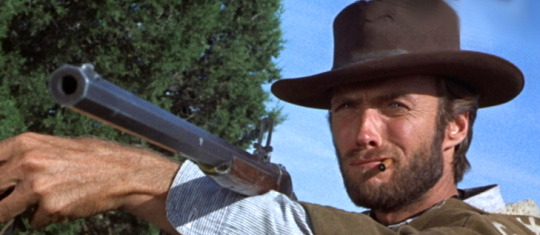
Nothing is better than when an iconic movie lives up to the hype. Clint Eastwood, Eli Wallach, and Lee Van Cleef play off of one another perfectly. I was impressed by Wallach as Tuco in particular: his character initially seems like a one-dimensional greedy criminal, but the performance is packed with wonderful moments of humanity. Do I really need to say anything about the direction? Or about the wonderful storyline, which takes on an almost mythic feel in its grandeur? Or that soundtrack?
Die Niebelungen (both movies) (dir. Fritz Lang, 1924)
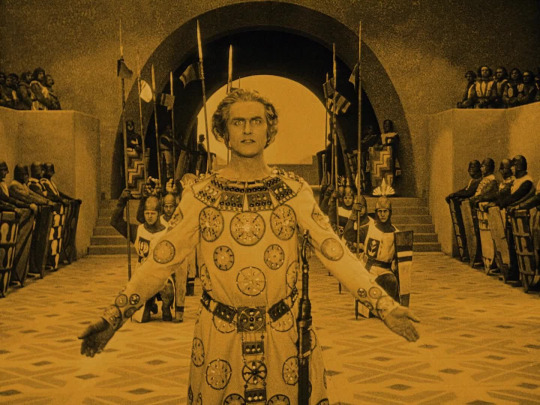
I did NOT expect to love these movies as much as I did. That they would be dazzlingly gorgeous I never doubted: the medieval world of the story is brought to vivid life through the geometrical mise en scene and detailed costuming. However, the plot itself is so, so riveting, never losing steam over the course of the four hours it takes to watch both movies. The first half is heroic fantasy; the second half involves a revenge plot of almost Shakespearean proportions. This might actually be my favorite silent Fritz Lang movie now.
Muppet Treasure Island (dir. Brian Henson, 1996)
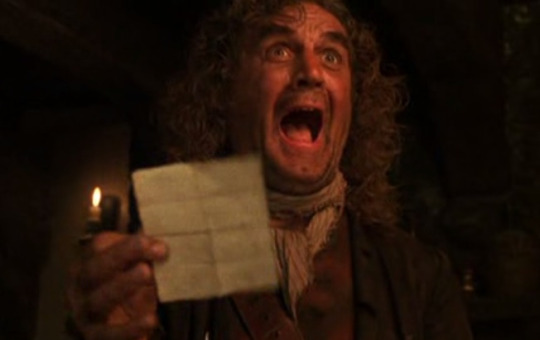
I understand that people have different tastes and all, but how does this movie have such a mixed reception? It’s absolutely hilarious. How could anybody get through the scene with “THA BLACK SPOT AGGHHHHHHH” and not declare this a masterpiece of comedy? And I risk being excommunicated from the Muppet fandom for saying it, but I like this one more than The Great Muppet Caper. It’s probably now my second favorite Muppet movie.
Belle de Jour (dir. Luis Bunuel, 1967)

I confess I’m not terribly fond of “but was it real???” movies. They tend to feel gimmicky more often than not. Belle de Jour is an exception. This is about more than a repressed housewife getting her kicks working as a daytime prostitute. The film delves into victim blaming, trauma, class, and identity-- sure, this sounds academic and dry when I put it that way, but what I’m trying to say is that these are very complicated characters and the blurring of fantasy and reality becomes thought-provoking rather than trite due to that complexity.
Secondhand Lions (dir. Tim McCanlies, 2003)
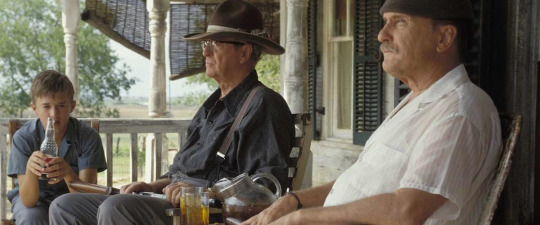
The term “family movie” is often used as a synonym for “children’s movie.” However, there is an important distinction: children’s movies only appeal to kids, while family movies retain their appeal as one grows up. Secondhand Lions is perhaps a perfect family movie, with a great deal more nuance than one might expect regarding the need for storytelling and its purpose in creating meaning for one’s life. It’s also amazingly cast: Haley Joel Osment is excellent as the juvenile lead, and Michael Caine and Robert Duvall steal the show as Osment’s eccentric uncles.
The Pawnbroker (dir. Sidney Lumet, 1964)

Controversial in its day for depicting frontal nudity, The Pawnbroker shocks today for different reasons. As the top review of the film on IMDB says, we’re used to victims of great atrocities being presented as sympathetic, good people in fiction. Here, Rod Steiger’s Sol Nazerman subverts such a trope: his suffering at the hands of the Nazis has made him a hard, closed-off person, dismissive of his second wife (herself also a survivor of the Holocaust), cold to his friendly assistant, and bitter towards himself. The movie follows Nazerman’s postwar life, vividly presenting his inner pain in a way that is almost too much to bear. Gotta say, Steiger gives one of the best performances I have ever seen in a movie here: he’s so three-dimensional and complex. The emotions on his face are registered with Falconetti-level brilliance.
The Apartment (dir. Billy Wilder, 1960)
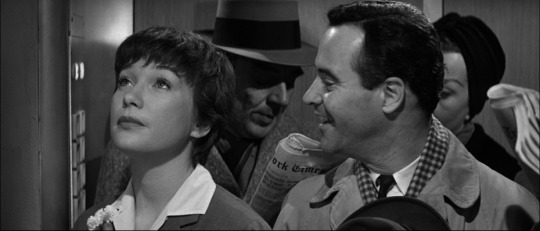
While not the most depressing Christmas movie ever, The Apartment certainly puts a good injection of cynicism into the season. I have rarely seen a movie so adept at blending comedy, romance, and satire without feeling tone-deaf. There are a lot of things to praise about The Apartment, but I want to give a special shoutout to the dialogue. “Witty” dialogue that sounds natural is hard to come by-- so often, it just feels smart-assy and strained. Not here.
Anatomy of a Murder (dir. Otto Preminger, 1959)
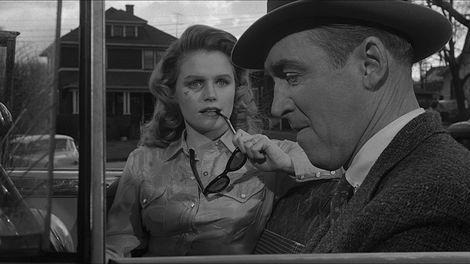
I’m not big into courtroom dramas, but Anatomy of a Murder is a big exception. Its morally ambiguous characters elevate it from being a mere “whodunit” (or I guess in the case of this movie, “whydunit”), because if there’s something you’re not going to get with this movie, it’s a clear answer as to what happened on the night of the crime. Jimmy Stewart gives one of his least characteristic performances as the cynical lawyer, and is absolutely brilliant.
Oldboy (dir. Park Chan-Wook, 2003)

Oldboy reminded me a great deal of John Webster’s 17th century tragedy The Duchess of Malfi. Both are gruesome, frightening, and heartbreaking works of art, straddling the line between sensationalism and intelligence, proving the two are not mutually exclusive. It’s both entertaining and difficult to watch. The thought of revisiting it terrifies me but I feel there is so much more to appreciate about the sheer craft on display.
Family Plot (dir. Alfred Hitchcock, 1976)
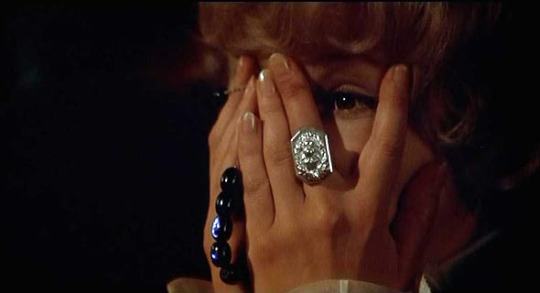
Family Plot is an enjoyable comedy; you guys are just mean. I know in an ideal world, Hitchcock’s swan song would be a great thriller masterpiece in the vein of Vertigo or Psycho. Family Plot is instead a silly send-up of Hitchcock’s favorite tropes, lampooning everything from the dangerous blonde archetype (with not one but two characters) to complicated MacGuffin plots. You’ll probably demand my film buff card be revoked for my opinion, but to hell with it-- this is my favorite of Hitchcock’s post-Psycho movies.
My Best Girl (dir. Sam Taylor, 1927)
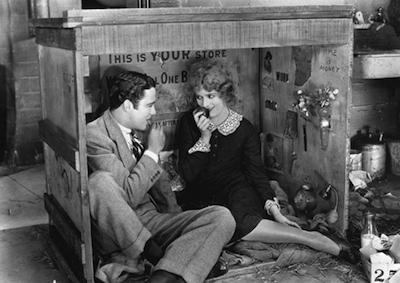
Mary Pickford’s farewell to silent film also happens to be among her best movies. It’s a simple, charming romantic comedy starring her future husband, Charles “Buddy” Rogers. Pickford also gets to play an adult character here, rather than the little girl parts her public demanded she essay even well into her thirties. She and Rogers are sweet together without being diabetes-inducing, and the comedy is often laugh out loud funny. It even mocks a few tropes that anyone who watches enough old movies will recognize and probably dislike-- such as “break his heart to save him!!” (my personal most loathed 1920s/1930s trope).
Parasite (dir. Bong Joon-ho, 2019)
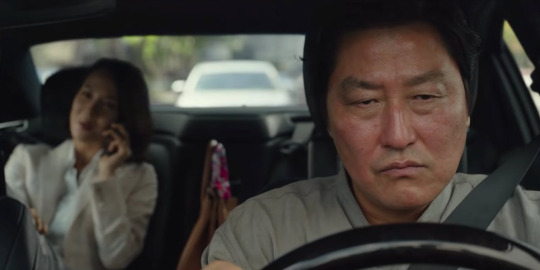
This feels like such a zeitgeist movie. It’s about the gap between the rich and the poor, it’s ironic, it’s depressing, it’s unpredictable as hell. I don’t like terms like “modern classic,” because by its very definition, a classic can only be deemed as such after a long passage of time, but I have a good feeling Parasite will be considered one of the definitive films of the 2010s in the years to come.
Indiscreet (dir. Stanley Donen, 1958)
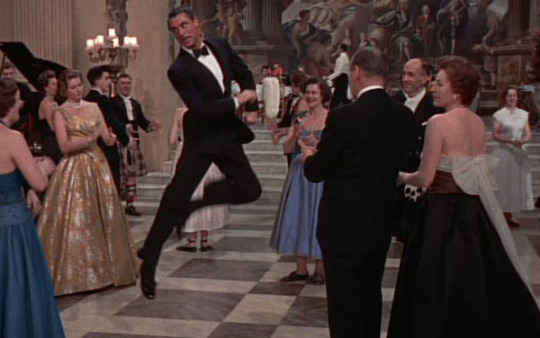
Indiscreet often gets criticized for not being Notorious more or less, which is a shame. It’s not SUPPOSED to be-- it’s cinematic souffle and both Ingrid Bergman and Cary Grant elevate that light material with their perfect chemistry and comedic timing. It’s also refreshing to see a rom-com with characters over 40 as the leads-- and the movie does not try to make them seem younger or less mature, making the zany moments all the more hilarious. It’s worth seeing for Cary Grant’s jig (picture above) alone.
The Taking of Pelham One Two Three (dir. Joseph Sargent, 1974)
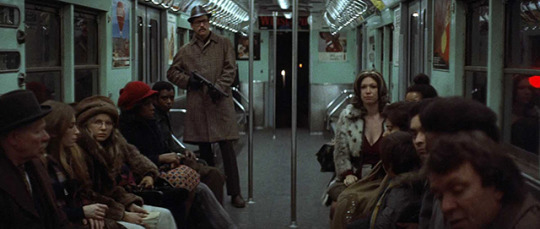
This movie embodies so much of what I love about 70s cinema: it’s gritty, irreverent, and hard-hitting. It’s both hilarious and suspenseful-- I was tense all throughout the run time. I heard there was a remake and it just seems... so, so pointless when you already have this gem perfect as it is.
They All Laughed (dir. Peter Bogdonavich, 1981)
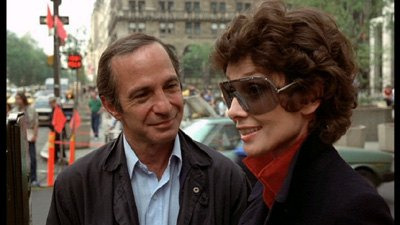
Bogdonavich’s lesser known homage to 1930s screwball comedy is also a weirdly autumnal movie. Among the last gasps of the New Hollywood movement, it is also marks the final time Audrey Hepburn would star in a theatrical release. The gentle comedy, excellent ensemble cast (John Ritter is the standout), and the mature but short-lived romance between Hepburn and Ben Gazarra’s characters make this a memorably bittersweet gem.
The Palm Beach Story (dir. Preston Sturges, 1942)

Absolutely hilarious. I was watching this with my parents in the room. My mom tends to like old movies while my dad doesn’t, but both of them were laughing aloud at this one. Not much else to say about it, other than I love Joel McCrea the more movies I see him in-- though it’s weird seeing him in comedies since I’m so used to him as a back-breaking man on the edge in The Most Dangerous Game!
Nothing Sacred (dir. William Wellman, 1937)
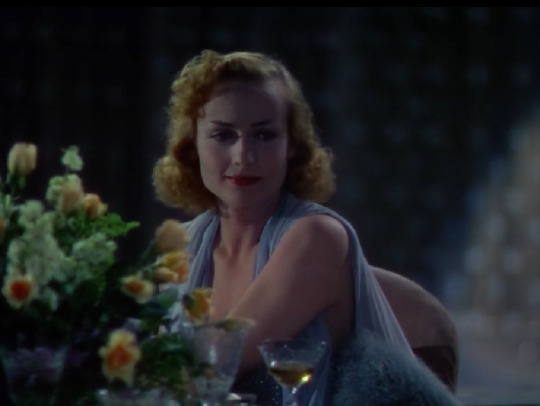
I tend to associate William Wellman with the pre-code era, so I’ve tried delving more into his post-code work. Nothing Sacred is easily my favorite of those films thus far, mainly for Carole Lombard but also because the story still feels pretty fresh due to the jabs it takes at celebrity worship and moral hypocrisy. For a satire, it’s still very warm towards its characters, even when they’re misbehaving or deluding themselves, so it’s oddly a feel-good film too.
Applause (dir. Rouben Mamoulian, 1929)

I love watching early sound movies, but my inner history nerd tends to enjoy them more than the part of me that, well, craves good, well-made movies. Most early sound films are pure awkward, but there’s always an exception and Applause is one of them. While the plot’s backstage melodrama is nothing special, the way the story is told is super sophisticated and expressive for this period of cinema history, and Helen Morgan makes the figure of the discarded burlesque queen seem truly human and tragic rather than merely sentimental.
Topaz (dir. Alfred Hitchcock, 1969)
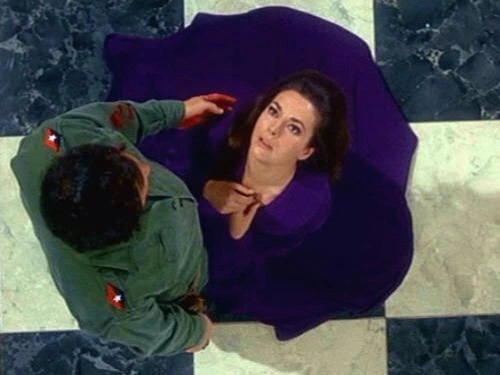
Another late Hitchcock everyone but me seems to hate. After suffering through Torn Curtain, I expected Hitchcock’s other cold war thriller was going to be dull as dishwater, but instead I found an understated espionage movie standing in stark contrast to the more popular spy movies of the period. It’ll never be top Hitchcock, of course-- still it was stylish and enjoyable, with some truly haunting moments. I think it deserves more appreciation than it’s been given.
What were your favorite cinematic discoveries in 2020?
#thoughts#belle de jour#topaz#family plot#the taking of pelham 123#the pawnbroker#nothing sacred#my best girl#applause#muppet treasure island#perfect blue#die niebelungen#parasite#the good the bad and the ugly#the palm beach story#they all laughed#indiscreet#oldboy#anatomy of a murder#the apartment#secondhand lions
155 notes
·
View notes
Text

I posted 7,059 times in 2021
71 posts created (1%)
6988 posts reblogged (99%)
For every post I created, I reblogged 98.4 posts.
I added 597 tags in 2021
#drarry - 135 posts
#harry potter - 131 posts
#draco malfoy - 130 posts
#fic rec - 46 posts
#drarry fic rec - 43 posts
#my writing - 28 posts
#drarry fic - 26 posts
#lovely people - 24 posts
#drarry microfic - 20 posts
#martin my beloved - 14 posts
Longest Tag: 101 characters
#a 2013 movie about robots controlled by the power of love who fight gigantic aliens from the ocean???
My Top Posts in 2021
#5
saying yes (instead of no)

Lights, Camera, Drarry 2021 fic claim
Author: Pineau_noir (me!)
Prompt #: self-prompt, Schitt's Creek, 2015, series
Word Count: 21,022
Rating: Explicit
Warnings: canon typical alcohol and drug use, marijuana use, explicit smut
Notes: Thank you so much @static-abyss for the beta, @ladderofyears for the Brit pick, and the @lcdrarry mods for everything! Oh and fuck jk and her hateful and extremely dangerous words. I DO NOT stand with her- terfs can choke
Summary:
“It’s a general store that’s also a very specific store,” Draco grumbled. “Most people won’t realise this, but I want to market Muggle goods to the Wizarding world as well. I want something that will help boost the economy of the Hamlet and Muggles have so many amazing things we don’t have.”
Draco sighed again. “I think it would benefit everyone.” He glared at Emily. “But there’s not a single witch, wizard, or wix who will shop at a place owned by Draco Malfoy.”
“What if it’s owned by Harry Potter and Draco Malfoy?” Potter asked.
“That would be preposterous,” Draco mumbled. “Harry Potter and Draco Malfoy would kill each other before the store opened.”
“What if you didn’t?” Emily asked. Draco opened his mouth to let her know, they would indeed kill each other, but before he could say anything, she continued, “What if it turned into a lovely business?”
“There’s only one way to know,” Potter said. “I really think this is a good idea, Draco."
Read it on Ao3
Sign commissioned from the incredibly talented and amazingly generous @dragontamerdame. Go commission them! You too can have beautiful art!!! 🎉🎉🎉🎉
108 notes • Posted 2021-06-16 12:10:54 GMT
#4
Omg @rockmarina found this picrew and it's literally the cutest fucking thing. So thank you so much for the general tag, I took it and ran ❤️
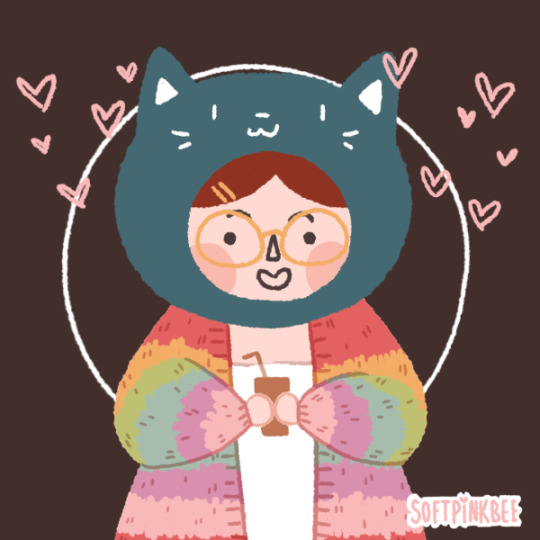
I feel like there's finally one that truly encapsulates the whole squishy mom vibe I've got, plus iced coffee!!
I'm gonna tag the hell out of this one because the people I know haven't been tagged yet!
@p1013 @veelawings @slytherco @cibeewastaken @the-sinking-ship @static-abyss @caroll-in @bluebutter-art @dragontamerdame @maesterchill @ladderofyears @xanthippe74 @shealwaysreads @tackytigerfic @fangqueen @gnarf @lqtraintracks and omg I know I'm forgetting people I'm sorry!!! But also please tag yourself if you want to do this one (and tag me because, I really do love seeing what people make)
Hey, now there's a link! 😂😭
119 notes • Posted 2021-03-09 17:43:01 GMT
#3
Hi! Idk if you care but the OP on the post about the German gymnastics team having unitards this year is a TERF
Y'all, why do Terfs have to ruin everything. I'll find the source myself and do that then
180 notes • Posted 2021-07-27 00:47:02 GMT
#2
As You Wish fanart by the incomparable @caroll-in

LOOK AT THIS ART!!!!!! I SWOONED
Um so, no big deal or anything, I definitely didn't freak out and squeak when I learned one of my favorite artists did commissions. And I really didn't daydream (for like an entire day) about what fic I might ask her to draw when I learned about said commissions. And then I definitely didn't pterodactyl screech when I got the final piece.
Look, we all know those are all lies, but let's pretend I was super chill the whole time, ok? Thanks. (I was the human embodiment of the hearteye emoji if anyone was wondering)
So, here is art from my first Drarry fic, for 2020's Lights, Camera, Drarry based on one of my favorite movies, The Princess Bride.
And if you feel like reading, your can find it here.
And if you want to commission Karol, I 17/10 recommend it. She's so crazy talented and also so wonderful to work with and LOOK AT THEM!!!!! 😭😭😭😭
185 notes • Posted 2021-02-03 00:09:08 GMT
#1
Can you believe Jonny Sims invented romance

516 notes • Posted 2021-08-27 05:52:19 GMT
Get your Tumblr 2021 Year in Review →
19 notes
·
View notes
Text
definitive VERY SERIOUS ranking of MCU characters, best to trash
Gamora and Nebula - tied for first place because prickly, traumatized assassin women? that’s my shit. prickly, traumatized assassin women working through their issues TOGETHER and growing closer as sisters? YEAH, babey! that’s the shit! I love them and they deserved arcs that loved them, too. biggest injustice in the MCU.
Thor - absolutely excellent. amazing work. distinguished slut vibes and a radiant beam on sunshine in this shithole world. again, never saw Endgame, but he deserved better.
Sam Wilson - going strong since 2014, babey. just an all-around great guy, good for him finally getting his own show. will I be watching it? absolutely not. not a force on god’s green earth could make me care enough to pirate a marvel television show in this the year of our lord and savior 2020, even if he is a very cool dude with wings.
Bucky Barnes - all the fun of Steve but no moral quandaries because everything bad that he did happened when he was being controlled by nazis and he feels really bad about it uwu
Peter Parker - yes OBVIOUSLY the movies did Peter dirty, we’ve all seen a fucking essay about it, making him Iron Man Jr was wack and being poor doesn’t look like that, but he’s cute and fun and I like Tom Holland, who was the emotional anchor who forced me to keep giving a sliver of a shit during Infinity War. Far From Home was pretty not good but would I see another Spider-Man movie? fuck, maybe.
Steve Rogers - idk I just think he’s neat. really love how he’s shaped like a dorito and hates nazis.
James Rhodes - I don’t think Rhodey’s ever said or done anything that wasn’t iconic and for that he deserves to be exactly one spot above his idiot best friend.
Tony Stark - I hold possibly the most unpopular opinion on Tony Stark on this entire hellsite, which is that he’s just fine. he’s fun sometimes, he’s irritating sometimes, he made some points during Civil War. he should probably lose more points for being a former war profiteer but if I started digging into comic book logic too much I’d have to change my url because Batman cooperates with cops and endangers children, so idk.
T’Challa - I don’t remember a TON about T’Challa’s actual personality because it’s been like 4 years since Black Panther came out and he had like 2 lines in Infinity War, but he’s a powerful nerd/jock multiclasser who spends most of his time surrounded by women who are very smart and dangerous and much cooler than him and I really respect that.
Natasha Romanoff - Natasha is difficult to rank because for a long time her dominant defining characteristic was being The Girl One, which means she has a different personality in pretty much every movie, and it was never interesting. if Marvel had rubbed two brain cells together and given her a solo movie between 2012 and 2015 she might have fared better, but alas. press F in the chat for Nat’s potential.
Groot, Rocket, Drax, Mantis - I love these funky socially incompetent aliens. more of them, please.
Bruce Banner - only interesting in Ragnarok when he’s Thor’s anxious comedic foil and boyfriend; thank you for that small gift, Taika. I never saw Endgame because I love myself, so I don’t know anything about professor Hulk and I don’t want to.
Peter Quill - fun in theory but loses points for being such a painful walking embodiment of the extremely heterosexual “idiot manchild gets hot competent gf by virtue of being white cishet protagonist man.” shut the fuck up she’s way too good for him.
Wanda Maximoff - despite all of Joss Whedon’s best efforts I really liked her in Age of Ultron and then my love for her just decreased with each subsequent appearance. like Natasha she was increasingly a different character each time; by Infinity War she didn’t have her accent anymore as if Elizabeth Olsen realized nobody else on set would remember or care about Wanda’s previous portrayals. on god I liked her so much that I was even down to root for her and Vision but then the majority of it happened offscreen and lost me forever.
Pietro Maximoff - mmm watcha saaaaaay
Hope Van Dyne - cooler than Ant-Man but not by much. should have been a lesbian and kissed Pepper Potts in the moonlight.
Carol Danvers - fuck dude idk, I’ve never seen a movie she’s in lmao
Ant-Man - the recurring joke with this bitch seems to be “haha can you believe he exists? that’s dumb!” and it is. it is dumb. why did we need him? it could have all payed off with him crawling up Thanos’ asshole and exploding but we didn’t even get that. bullshit.
Vision - man, fuck, I tried to put him higher on the list than Peter Quill and I couldn’t make myself do it. that’s how goddamn boring Vision was. and you know what? fuck it, we’re putting him lower than Pietro, too. and even Ant-Man! we’re scraping the bottom of the barrel here and he deserves it because I can’t think of one thing this dude did that I enjoyed other than being bad at cooking when he was trying to impress a girl.
Doctor Strange - I’m not going to make a Benedict Cumberbatch joke because that’s low hanging fruit but all I know is that this is the dude who’s mean to Tony in a horny way for five minutes of Infinity War. I never saw his movie, heard it was racist tho. and they didn’t even learn their lesson before they made Iron Fist! smh bombastic colonialism.
Clint Barton - last place because in the absence of a personality or interesting character arc I’m forced to judge him on the fact that Jeremy Renner radiates bad vibes and that in Endgame he gets a makeover that makes him look like he’d call me slurs for telling him to stop hitting on 16 year old girls at a gas station.
172 notes
·
View notes
Text
i'll be with you (but it'll be a different kind)
pairing: yoonkook/yoonjin | rating: G | ao3 read here
a short study on moving on
Yoongi broke the vinyl like he would a plate, a quaint awareness of a disaster but the quick denial of letting it fall – on the floor, in pieces. He swept each shard, vacuumed, and threw them in the bin. He crushed his music sheets and notes, thought better of it, and lit them with a scented candle.
Well, for fuck’s sake, the candle was his gift too.
So Yoongi walked to the collection area at three thirty in the morning, against the gusts of cold November wind, carrying all the evidence of the killer and the remains of its victim. He stood in front of the stack with an impulse to do something. Say a prayer? Curse them? Curse himself and bring them back to his apartment?
Ah, he wasn’t that stupid.
He truly wasn’t.
His stupidity was drained when he decided to fall in love with his roommate and friend that couldn’t be his in this lifetime.
So he came back to his home rid of everything Kim Seokjin owned and touched. Yes, even the bedsheets he washed yesterday.
“The couch it is.” He plopped down to its uncomfortable mattress and was immediately lulled not by the comfort of sleep but by the escape it offered.
He lost track of time in the next days… or probably weeks because the next time he went out for a walk to the mart, he was greeted by imposing Christmas decorations and too tall synthetic trees that wouldn’t look good in apartments that only housed one.
He came back, still alone, but at least joined now with ingredients for proper homemade food. He won’t be lonely on Christmas, not with two bottles of wine, a variety of seafood (which Namjoon hated the most, and Yoongi would order in the largest serving just to spite him), and his good old comfy socks.
He switched on the television to watch Melancholia, a fitting holiday movie in his honest opinion, and turned it up to the highest volume to tune out the looping Christmas carols outside his window and across the hallway where other occupants have rooms over to tide away the lonesome.
It was two thirty and two disaster films later that he heard the ghost of his broken heart.
It was one of the songs he wrote for Jin, the notes not at all the same, but the melody line was correctly embodied. He started up from his drunken stupor on the floor and trudged towards his kitchen sink where he dabbled his face in water.
It wasn’t the alcohol. So it certainly must be the crazy in him… well, until he realized the notes were coming from next door. The walls were thin anyway.
He nonchalantly knocked on the door of his neighbor, not caring at all if it was the devil’s hour, not when the tenant itself did not care about public disturbance.
It opened a crack wide enough for Yoongi to sweep the whole place up in seconds. Tidy floor, unmade bed, three monitors on a desk, neon lights, a christmas tree unabashedly decorated with the most frivolous pieces beside the dining table, and a guitar on top of it.
“Did I wake you?” He was taller than Yoongi, buffer, and very decorated like his Christmas tree. Daith, lobe, and eyebrow piercings, sleeve tattoos on his right arm, and shoulder-length electric blue hair tied in half-ponytail. But what caught his attention the most was the doe eyes that seemed too innocent, but Yoongi was familiar with the pretension that hovered on the surface. This boy knew pain enough to effectively cover it.
“That was my song,” Yoongi said in his usual deadpan delivery. He couldn’t get any cheerier than this.
John Doe perked up (if it could be any more possible). “Ah so you’re the one!” Then his expression immediately shifted to wariness. “Oh wait, you might be offended. I should apologize – “
“Some notes were mismatched, yes. Couldn’t be helped when you learned it by ear.” Yoongi looked at him for confirmation, and John Doe nodded enthusiastically. “But it’s all right. You played the piece so beautifully for someone who did not know it was a love letter.”
The way John Doe changed his smile to a thin line Yoongi knew at once that this was a person who simultaneously wore their heart on a sleeve but chained it before it could truly fall.
“Is it safe to assume the letter’s non-reciprocation when you haven’t played those songs for a month?”
“What else could there be?”
The neighbor bit the inside of his cheeks before answering, “Maybe you just didn’t need love letters anymore?”
Yoongi sighed. “Just keep it down. It’s three in the morning.”
“But it’s Christmas?” John Doe’s eyes suddenly widened. “Oh my manners! Merry Christmas Sir!”
“I don’t believe in Santa Claus. Or Jesus. Or capitalist splurges.” Yoongi shoved his hands into his sweatpants. “I have marinara surplus. Do you want a plate?”
-----------------
When New Year rolled again, Yoongi knocked on his neighbor’s door. He slept with headphones in full volume, god be damned his hearing, on newly bought bedsheets that did not smell of Jin and pillows that did not have a strand of his hair. He really couldn’t turn down John Doe’s question of whether he could still play the cursed song or maybe he was two-bottles-of-wine-disoriented enough to put up a rather good argument why he shouldn’t.
“So will you cover your ears when you go to sleep?” John Doe asked after his second slurping of seafood marinara.
“Why should I?” Meanwhile, Yoongi surfed Netflix for his disaster anxiety fix.
“Try Seeking a Friend for the End of the World.” John Doe finished his plate clean. He let out a burp with an apologetic smile to his temporary Christmas host. “Well, I was wondering if I could still play the song. It’s yours anyway so you have all the rights.”
Yoongi’s eyes glazed over the first few seconds of the film, slightly amused at the insurance agent selling an apocalyptic package. “When music is released to the public, it never becomes the composer’s alone. It is also owned by the listener…and whatever they deem the music to be.”
“I’m Jeon Jungkook.”
“I just let you eat my food.”
“I’ll be your friend for the end of the world.”
A beat. “Fine. Min Yoongi.”
But it was a week of listening to ragged notes and misplaced sharps, and his (still) perfectionist ass wanted to right it.
“It’s open,” Jungkook yelled from what Yoongi presumed was his computer chair.
He sauntered inside with measured caution and watched his neighbor tick away in codes on three different screens. Yoongi silently slid the music sheets on a small free space on Jungkook’s desk.
“Software developer?”
“Not really. I’m a solutions specialist, the yes-boy,” Jungkook replied with a smug grin. He hit enter and the lines start to jumble together as he swiveled to face Yoongi. “You re-wrote your notes. You must be a producer or something.”
Yoongi clucks. “Close. A film composer.”
“Do you go to Hollywood?”
“I’m not made for performative limelight. The shadows are bright enough.”
“Cool. I want to make a film someday.”
“You have a day job.”
“Can’t a man have two dreams?”
“Touche. One can never have too many.”
“What’s yours then, Yoongi?”
“Just one but it won’t be mine.”
-----------------
March. Spring coming alive, and for the first time in months, Yoongi genuinely thought he was getting better and over him. Jeon Doe (maybe he’ll always call him this) was a light companion – not imposing, a bit fluttery, but steady in his essence. Perhaps it was the continuous wonder that ebb in his eyes or the utterly soft disregard of pain for something nonchalant.
On the eve of March 1st, he stroked again the keys of his piano, and Jungkook came into his unit and accompanied him with a guitar. It was an improvisation of chaotic notes in Yoongi’s head and by magic, Jungkook floated with that tornado. The contrast and the blend gave way to an unlikely partnership of melody and rhythm.
And on March 1st, Yoongi felt butterflies again when Jungkook joined him on the bench and giddily watched his fingers dance on white and black.
But on the second day of the month, the butterflies were replaced with quicksand.
Kim Seokjin called and wanted to meet. It was funny how in a moment of hesitancy, it was his heart who doubled and his feet that led. Their favorite bar, whiskey on the rocks for Jin, dry scotch for him, and an expanse of silence of between them.
“He’s too busy with production at the moment.” Jin downed his drink in one gulp. Yoongi didn’t even need to ask.
And I’m the only one who’s available. “At the moment is how many months?”
“For three months now.”
“You should break up.” An unsolicited advice Yoongi gave more than twice with not much success.
“If I was a music company, maybe he would do me,” Jin jested, holding the empty glass in his hand. “Should I buy one?”
“Buy his affections as well and monopolize them.” It was a banter Jin was used too and maybe by now, he should have known that Yoongi hid half-truths in them.
“They’re too intense for me alone. He’s always destined for the world.”
What could Yoongi do but surrender at the unspoken request of comfort. “There’s someone who treats you like you’re his whole world.”
“I wish I did too.”
Yoongi never had a sip of his scotch, but Jin’s languid kiss was enough to get drunk on. He lost the flutter and the lightness, and dove headfirst in heavy, steely waters. Yoongi missed the suffocating pressure and the sensation of bursting at the seams. If his heart would burst at this moment, it would shatter a hundred times more for the many touches and whispers to follow. He would gladly die in this misshapen illusion.
-----------------
“Your door was always locked,” Jungkook greeted a month after, carrying a big tub of fermented kimchi. “My dad dropped by to give me spares.”
Two weeks before this, Jin left in a hurry to go to the airport, saying Namjoon had been in an accident, and two weeks after, Yoongi never heard back from him.
He accepted the side dish from his neighbor, but nothing went past Jungkook. Realization was plain in his face, but he chose not to comment on it.
“Yoongi.”
“Hmm.” It was danger meeting Jungkook’s eyes so Yoongi kept his downcast.
“I told you before.”
“What?”
“That I’ll be your friend for the end of the world.”
Yoongi didn’t respond, and Jungkook took the cue to leave.
He repeated that same line later that night when he heard Yoongi trash his place, his bare arm catching the brunt of a baseball bat just before it landed on the piano keys.
“Why would you go so far?” Yoongi sneered, anger seeping through his controlled demeanor.
“Why would you go so far?” Jungkook cradled his arm like he cradled his pain. Like it was nothing. “It’s the end of the world.”
“I need a friend.”
-----------------
It was easier being with Jungkook – lighter, happier, with no care in the world. He was also honest in a straightforward, unassuming, and endearing way especially when those doe eyes of his were used to an advantage.
When he told Yoongi in the middle of Battle Royale, out of the blue, with no precedence whatsoever that “I don’t want to be just your friend”, it knocked the air out of the latter. And when Jungkook followed it with “You can use me, however you want”, Yoongi knew he had to get things sorted.
Lest he wants Jungkook trapped inside the vortex of unresolved feelings.
So Yoongi didn’t give him a tangible response. He just skidded closer to him on the couch and Jeon Doe took the cue to lay his head on the crook of his neck as another student was slashed to their death on the screen.
When credits rolled in, Yoongi dipped his head and found Jungkook already waiting with bated breath.
-----------------
“Ah, you found me.”
Jin was back in his penthouse in Seoul, alone with no Namjoon in tow.
“Am I a week early?” Yoongi asked.
“I just got in today.” True enough, unopened suitcases littered his living room. Too many suitcases for a vacation. “I’m relocating back. Is there such a thing?”
Yoongi went to one luggage and punched in the password Jin used when Namjoon and him got together, it did not open, so he tried another combination. Ah, only his birthdate. Yoongi packed the first of his clothes to cabinets he was all too familiar with. He went on with this rudimentary task with Jin at the kitchen, cooking up something for the two of them.
In a parallel universe, Yoongi would have been happily contented with this.
Tidied up, folded, and free, the two went through a simple steak and pasta dinner.
“We broke up.” He twirled his fork endlessly. “It hit me when I saw him go to an award show. I could never keep up with him, Yoongi, not when I’m taking a backseat while his dreams sit in the front.”
“Don’t be silly.”
Jin stared at him like he was betrayed.
“Don’t be silly,” Yoongi repeated, drawling each word. “Namjoon and his goals sit in another sports car while you drive a rundown secondhand.”
That made Jin laugh. “You’re merciless.” And then he grimaced. “I never felt this neglected. It was never this way when I was with you.”
“We’ve never had anything, Jin. You didn’t let me have anything,” Yoongi finished clean his pasta. He folded his napkin like a good guest and waited for Jin’s retort.
But he just sighed, defeated. “I destroyed what good we had. I’m afraid I also lost the friendship.”
“You know I can’t go back again to you.” Yoongi didn’t know if he threw a question or a statement.
“I saw it the instant you came through that door.” Jin put down his fork and trained his eyes on his best friend. “Happiness looks good on you.”
“You would have known already if you had just looked at me.”
Jin gave him a sad smile. “And it would have been the best sight had I tried harder.” He picked up again his fork, his lips pursed, his eyes brimming with tears. It was a foreign scene, Jin coming undone in front of him, not because of Namjoon, because of him. “So who is this guy?”
“I call him Jeon Doe.”
Jin kept brushing the side of his eyes while he twirled strands of noodles in his fork. When he opened his mouth to eat, tears brushed down his cheeks, breaking in rivulets as he chewed. “That’s a stupid name.”
Yoongi noticed the upwelling – the comeuppance of what was lost trying to mask itself as the crescent emotions. He knew it when Jungkook kissed him back that night, that he could never go back to this uncertainty. “And stupidly in love with me too.”
Jin continued to chew with salty tears. “I’m sorry, Yoongi.”
His hands clenched at the name that left his lips. “I got tired of being your placeholder. You couldn’t just leave and expect me to stay in one place. I also crack every time you touch me, and I shatter every time you go. I broke, Jin. I got torn apart, and I wasn’t sure whether I could still handle your overspilling love for someone else when I couldn’t even hold any for me.” Yoongi’s fingers stretched to touch the dam that escaped his friend’s eyes. “You must understand.”
“I’m sorry, Yoongi,” Jin repeated. “And I understand it. I get it now. I see it. It’s just overwhelming – this mountain of regrets and what-ifs and utter disregard I made for my own happiness.”
“I got in the crossfire.”
“A victim willing.”
“But not anymore.”
Jin shook his head. “No, not anymore.” He intertwined his fingers with Yoongi. “I hope it works out for you and Jeon Doe.”
Not a minute longer, Yoongi pulled away from Jin’s touch. “I hope you heal.”
-----------------
Jin saw them on the same piano bench, playing a duet in the middle of a wedding reception, hands flying about, touches fleeting but enthralling, releasing captivating, fluttery sounds – almost akin to freedom.
He was seeing now in full high-definition panorama the gravity of his consequences. He let go of his two great loves, one he loved with no fail, the other he took to fail.
And so he welcomed the splendor of pain. He had two great loves, and regardless of how they ended, they deserved a thorough journey of grief. He could only hope that at the end of it was what he saw in Yoongi.
Freedom.
#yoonkook#yoonjin#bts fanfic#bts fic#min yoongi#jeon jungkook#kim seokjin#mention of namjin#fic!pseudolily#fic!pinkhairedlily
2 notes
·
View notes
Text
36: Half Full (Joe Mazzello x Y/N)
A/N: 36-year-old teacher Y/N seeks the right man with whom to start a family. One day while working as a camp administrator, she shares a mutual attraction with the uncle of one of her favorite young campers. Could her dream become a reality or will old fears prevent her from taking a risk? This is Y/N’s perspective of my story 36: Reset, in which Joe Mazzello, also eager to start a family, meets Y/N while caring for his nieces. Joe’s family members are written as fictional characters. This story is dedicated to my mother, who strives to keep the glass half full and reminds me to do the same.
@warriorteam1924 @marianaletosnape @im-an-adult-ish @johndeaconshands @thatstuckyhoe @amethyst-serenade @orionis8689 @jd-johndeacon-or-jackdaniels
Y/N opened her eyes and followed the morning sunlight fanning across the floor. She palmed her phone on the side table, then flipped onto her back and brought up her Notes for the day. She took in the mundane reminders about camper pick-ups and staff time sheets and focused on the day’s big event: a reunion with her eight college friends. The tight group remained close in their 20’s. Now, a decade later, it was harder to stay connected as their lives splayed in different directions, as evidenced by the reason for tonight’s festivities: Vanessa’s engagement and Ashley’s pregnancy.
She looked forward to celebrating with her friends. Yet, Y/N couldn’t ignore the gnawing feeling that her dreams, those dreams, seemed unattainable. A wall had been erected within her from a past experience, creating a barrier. That inner turmoil, however, was countered by her day-to-day reality. Y/N was a woman with full life: a passionate educator, an art enthusiast and a skilled improv performer. What she longed for most was missing: a loving husband and children. For now, Camp Administrator extraordinaire would have to do. To that end, she rolled out of bed and slipped into a pressed shirt, capri pants and sneakers.
Her carefully folded sundress and her favorite strappy sandals for the evening joined lunch, water bottle and phone in her backpack. She stepped outside to greet the humid day. Arriving at the YMCA, she locked her backpack and retrieved her clipboard, looping her key lanyard around her neck. Y/N entered the large gym, observing the children with their counselors and eyeing the many pockets of action. She offered greetings while ensuring everything ran smoothly.
Suddenly, a small familiar figure came toward her. A man navigating a stroller followed behind.
“Hi, Jessie,” Y/N greeted one of her favorite campers. Y/N bent down and glanced at the toddler nestled in her stroller. “Hi, Josie,” she said, then rose.
“Hi, Y/N. This is my Uncle Joe.” Jessie’s head tilted up to the slender gentleman with wavy auburn hair, who looked around Y/N’s age. Jessie clutched her uncle’s hand tightly as she elaborated. “He’s taking care of Josie and me while my parents are at Cousin Carol’s wedding this weekend…” Jessie provided a litany of details as Joe and Y/N looked at each other and laughed. When Jessie paused, Joe extended his hand. “I’m Joe, nice to meet you.” Suddenly an item on her morning Notes flashed before her: Jessie, Yellow Group: Joe Mazzello pick up. He seemed so at ease. How lovely that he was caring for the two girls for three days. Not an easy feat. His sister must really trust him. And Jessie certainly seemed fond of him. She smiled at the sweet, attractive man before her. “Hi, Joe.” Joe’s eyes lingered on her.
Y/N shook Joe’s hand and continued, “Your sister wrote saying you’d be helping with the girls. That’s so nice. I’m Y/N/Z, the Assistant Director of the camp. If you need anything please let me know. Jessie is a wonderful camper!” She winked at Jessie who smiled and then spoke to Joe before joining her group. Suddenly, Y/N felt a tap on her arm and turned to speak with a parent, reluctantly losing sight of the handsome man she had just met, who softly uttered “Thanks.” Then, as always, Y/N found herself caught up in the fray. It was her favorite place, really: people coming to her with issues to resolve, questions to answer, laments to be heard.
Y/N caught Joe leaning down to check on Josie who was sitting comfortably in her stroller playing with a toy. She spotted a towel and water toys in the lower basket of the stroller and figured he’d be taking her to the playground for sprinkler fun. Joe spoke to his niece softly and then gave her leg a kiss. It was a natural, loving gesture. Y/N forced her gaze away from him to focus on two counselors who suddenly were speaking before her, but she sensed he was watching her as he strolled away. And just as he reached the exit, she turned and waved to him. “Oh. My. God.,” she thought, catching herself and bringing her hand to her clipboard. Was she flirting with a child’s guardian? What was wrong with her? Before she could further berate herself, Joe waved back with a big smile. It had been awhile since her body had an involuntary reaction to a man. Her heart suddenly started to ramp up like a pole vaulter tearing down the track, gaining speed, preparing to catapult. Yes, she felt like she was flying. Warmth rushed through her and she felt a lightness she couldn’t quite describe.
The day ran smoothly and at 3:00, she took a quick break, heading to the restroom with her make-up bag. Y/N checked herself in the mirror. She looked like she had been running up and down three flights of stairs non-stop, except for a few minutes to down a sandwich, yogurt and fruit, chased by a few swigs of water. That look, though accurate, should be addressed before she saw Joe again, she thought. She reapplied make-up and freshened up. She tucked her bag away in her office and picked up her clipboard. Back in the gym, she took in the quiet activities that signaled the wrap up of the day: board games, crafts and ice pops.
A half hour before camp ended, Joe wheeled Josie into the gym. Y/N appreciated he wasn’t among those who arrived late for pick-up keeping the staff waiting. The man took his responsibilities seriously. Mostly, she was glad to be able to cast her eyes on him again, and hoped for the chance to speak with him.
Joe let a restless Josie out of the stroller, and he followed behind her closely as she walked around. Y/N was impressed that he was mindful about preventing her from getting in the way, or worse, getting hurt. Setting out to make group rounds, Y/N approached them. “Hi, Joe,” Y/N said softly. She bent down to Josie. “Did you have fun in the playground with Uncle Joe?”
“Fun Un JoJo!” Josie responded as she toddled around and clapped her hands.
Y/N laughed and turned to him. “A standing ovation. I’m impressed.”
He chuckled and looked down briefly. “Well, we had fun, but I have to say, it was tiring. And I’m just watching one! Amazing you look so, uh, calm after running the show here.” Joe said admirably, extending his hands in a grand gesture.
“I’m a third-grade teacher so I’m used to it,” Y/N said. “I’m working on my master’s degree so I can be a Principal one day. This gives me good practice,” Y/N offered up some personal information to see if Joe responded. So many guys were so self-involved.
“Wow, that’s really impressive,” Joe said sincerely, eyeing her. His response caused her heart to flutter again. The conversation was cut off as Josie bolted toward her big sister. Joe fell into step close behind her. Y/N made her way across the gym, checking in on groups and finally sidled up next to Jessie, who was embroiled in a game of Chinese Checkers with a counselor. Kneeling on the floor next to the game, Joe unwrapped a watermelon-flavored pop a counselor gave him and offered some to Josie, who eagerly took some bites. The sticky pop started to drip, and Joe took his backpack off and unzipped it with a flourish, retrieving a napkin to wipe her up. “Good reflexes,” Y/N mused.
Jessie glanced at Y/N as her opponent contemplated her move. “Y/N, did you know Uncle Joe is a FAMOUS MOVIE STAR?” she bellowed.
Y/N immediately flashed back to her conversation with Jessie’s mother the prior evening. “Oh, Y/N,” she had said, “Remember, my brother Joe will be picking Jessie up tomorrow. You got my e-mail. You’ll recognize him.” She said with a wink. “He was in Bohemian Rhapsody. And, The Social Network. Bunch of things.”
Back in the present, Y/N played it cool. “Wow, interesting,” she responded evenly. “And he’s a GREAT UNCLE!” she added enthusiastically, trying to steer the conversation to the present, seeing Joe looking down embarrassed.
“Who is successfully making a mess with this pop,” Joe retorted, wiping his mouth with the napkin and giving Josie another wipe, before she took off for the crafts table. Joe rose, his face a shade of crimson, and followed her.
Y/N’s boss signaled the floor was covered, and she took her leave to change. She reemerged wearing her flowery sundress with wide straps and a deep neckline that accentuated her figure. Her elegant sandals gave her shapely legs a nice lift and embodied the ease and comfort of summer. Standing near the doorway, Y/N bid good-bye to families, wishing them a good weekend. Joe walked toward her to retrieve the parked stroller.
“You look…nice,” Joe said haltingly, without any emotion. “Big night out?”
“Thank you.” Her faced flushed. “I’m meeting my college friends. One just got engaged and another is expecting.”
“Lots to celebrate.” Joe said, his taut lips relaxing into a wide smile, seemingly relieved by the answer.
“Yeah,” she said wistfully. “You know, life in the 30’s…”
‘Uh. Yeah,” Joe uttered, his eyes trained on her. Suddenly distracted by his nieces, Joe turned. Squatting to his knees, he spoke quietly but firmly to Jessie. Then he stood and turned to face Y/N. He caught her eye, his face full of intensity. “Y/N,” he said softly, “I was wondering, if, uh, one day, you might want to grab dinner.” She looked at him. And the reality hit her. She could be present, rather than thinking of yesterdays. She could take in the joy she was feeling. She could take the risk. “I’d love that. Let me give you my number.” She hastily wrote it on a paper on her clipboard and gave it to him. She sighed, feeling that inexplicable lightness return. Maybe part of that wall was chipping away.
“Great,” Joe said to Y/N with a smile. “I’ll probably need two days to recover after my sister gets back,” He laughed. “I’ll text you. Maybe we can get together next weekend?”
“That should work,” she said. “Bye...” her voice trailed off, as a counselor interrupted.
“Have fun tonight,” Joe called after her. After a quick check of the stroller buckle, he took off, taking Jessie’s hand. “Bye, Y/N!” Jessie called, turning.
Y/N waved to Jessie, noticing Joe’s nicely filled out cargo shorts and firm biceps extending from his t-shirt, as he headed out the door with his two charges.
*****
The latest Williamsburg bar considered all the rage was dimly lit with modern brass drop fixtures and a plethora of votive candles. The friends gathered on comfy chairs and a couch set in an oval. They held colorful drinks and indulged in the bounty of tantalizing appetizers set out on the tables before them. They toasted Vanessa and Ashley. The years hadn’t changed their easy banter, and their shared jokes and memories transported them back to golden, carefree days. The conversation grew more serious as the friends discussed their present lives.
“What’s going on with you, Y/N?” Vanessa asked eagerly. Her pear-shaped diamond glistened as she raised her mango-infused drink.
“Well, I LOVE working at the camp.” Y/N began. “The kids are great, and this year, we have a dance competition.” She shook her head. “Well, we’re not calling it a competition, cause we want every kid to express themselves. Our dance teacher is a member of the dance company Alvin Ailey II….”
Vanessa cut her off with no qualms. “Yeah, that’s great. Come ON! Get to the good stuff. You seeing anyone?”
Y/N paused. Images of Joe shaking her hand, waving to her, blushing and asking her out flashed, and she felt her heartbeat quicken. “Well actually…just today, the uncle of one of my campers asked me out. He’s really nice and so…handsome.” She knew she was sporting a dreamy expression.
Awkward side glances were exchanged by the friends, who fell into an uncomfortable silence. Y/N looked around at them perplexed.
Vanessa, always one of the boldest among them, cocked her head and spoke. “So…um, is this a sugar daddy situation?” she asked.
“WHAT??” Y/N gasped. She started to laugh so hard her breath suspended for a moment. “OHMYGOD!! What are you thinking?? He’s not, like, YOUR uncle. He’s our age. He’s in his 30’s. The girls dissolved into uproarious laughter, falling into each other.
“Here’s to the 30’s,” Ashley said, through her own laughter, rubbing her curved belly with one hand and raising her cranberry juice with the other.
“To the 30’s,” Y/N said, raising her Cosmo.
*****
Therapy was every other Tuesday at 7:00 p.m.
Ann Garnett, Ph.D. saw herself as a tour guide accompanying her patients as they revised their pasts and envisioned their futures, offering a fresh canvas on which to sketch new interpretations, plans and realized truths. She gingerly accompanied Y/N back in time to allow her to work through her painful break-up with Derek. They had loved each other passionately, but it became clear that they were on different tracks. For Y/N, there were education certificates to obtain, cultural events to experience, improv shows to perform and friends to see. Derek, six years her senior, was eager to buy a house in the suburbs and start a family. He had enough of tiny apartments with unreliable plumbing and the constant churn of neighbors who kept late hours. He was unwilling to wait-or compromise. Staying in the city for even a few years so Y/N could engage in her enjoyments was out of the question. Y/N had to choose between a life she wasn’t ready for with a man she was in love with or creating her own desired life. She chose the latter. And though her life was fulfilling, Y/N often wondered if she gave up her one chance at love and having a family, which now, she wanted more than anything. Ann helped her to accept that she made the right decision based on who and where she was at the time. Most importantly, Ann helped Y/N work through the fear of repeated disappointment that lapped at her and prevented her from entering another serious relationship.
Y/N planted her backpack on the couch next to her. “So. I had a date.”
“Oh?” Ann’s voice and eyebrows raised slightly. She took in Y/N’s evident excitement.
Y/N recounted meeting Joe at camp and their interactions. She spoke warmly about the affection and care he demonstrated toward his nieces.
“That’s lovely.” Ann said.
“It was.” Y/N said. “He took me for a delicious dinner. We both like good food and travelling. It was so easy to talk with him. He was interested in my work at the camp, having seen me in action.” She giggled proudly before continuing. “He asked me a lot about my improv with Upright Citizens Brigade. He’s an actor, and he described how he improvised during some of his scenes. Yeah, we really connected about that.”
“Sounds like you have some shared interests. And he respects YOUR interests.” Ann concluded.
Talking about the date laid bare the plausible reality that it was positive – and it could evolve. And that made it feel so fragile and scary. Y/N felt like she was clutching a vase of etched glass closely to protect it. Yet despite her efforts, it tumbled from her firm grasp in slow motion. She reached for it in mid-air, but before she could swoop in, it crashed and shattered. Suddenly, the positive feelings dissipated. She just couldn’t risk having them wrap around her heart, create a stronghold, and then witness the inevitable unraveling of a promising future. Again.
“Well,” Y/N asserted, her tone becoming firm, “It’s not going to work, unfortunately. He’s going to move to LA.”
“Oh? When’s he leaving?” Ann asked casually.
“It’s not planned. Yet. but he’s an actor and director. He’s going to have to go at some point.” Y/N sounded annoyed having to explain what seemed like an inevitable reality, not worth additional discussion. Case closed. Next subject.
Ann considered her patient, whom she greatly admired. “You don’t know if Joe will move to LA. His family is here, after all. And if he does, well, many couples relocate for jobs. Fortunately, wherever you go, there will be a need for teachers-and one of your caliber would be in demand. And LA has a great Citizens Brigade.” She added with a smile. Her voice and words opened up the canvass for sketching. “You’re not tied down. You can be flexible. And, there’s no need to plan everything today. You can’t, really. Let yourself enjoy the unfolding. Get to know Joe. See if you fit together. You’re at a different place now than you were with Derek. And Joe is a different person than Derek. He’s proven that already.”
Y/N stared at Ann, taking in her wise and objective words.
“You know, Y/N,” Ann said, her eyes taking in the lovely young woman before her, so deserving of love. “The glass can also be half full.”
Ann closed her notebook, signaling the session’s end.
That evening, Y/N slept restlessly as dreams spun through her head. In the last one, she was clutching a vase tightly, protectively. A figure stood in the darkness. Fearing it would take her vase, she turned to run. “Wait, Y/N!, Wait for me,” the figure called to her pleadingly. She turned back. The figure stepped forward into a spotlight. She strained to make out its features. It was Joe, wearing black trousers a button-down shirt and black blazer. The vase in her arms, now also shrouded in light, caught her eye. As she gazed down, she realized it had transformed to a baby swaddled in a blanket.
The dream startled Y/N awake. Her phone vibrated. She pulled it out and saw a text from Joe: “Enjoy the kiddos today. Can’t wait to see your show tonight! Break a leg.” A smile emerged, as Y/N replayed her dream and reread Joe’s text, excitedly anticipating her show that evening.
Maybe the glass can be half full.
My Masterlist
#joe mazzello#joe mazzello fanfic#joe mazzello x reader#joe mazzello fan fiction#joe mazzello fanfiction#joe mazzello x y/n#romance#upright citizens brigade#true love#borhap fanfic#improv#adulting#therapy
40 notes
·
View notes
Text
Ranking : The Coen Brothers (1954/1957 - present)
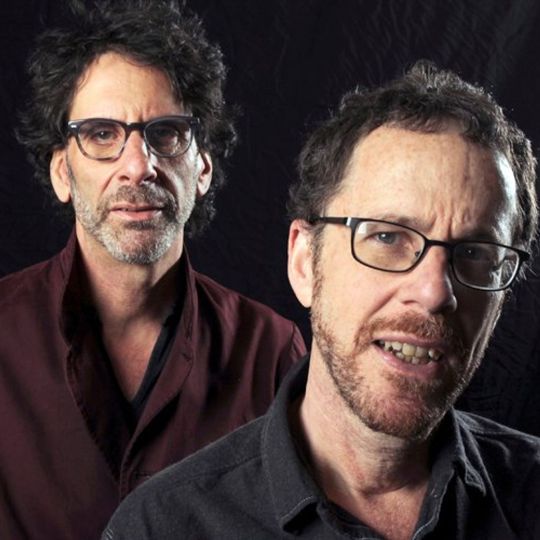
Directing a film can be one of the most vast, task oriented and stress inducing undertakings imaginable, which makes it odd that more directing duos, specifically sibling duos, do not exist. Sibling duos like the Wachowskis, Hughes, Farrellys, Safdies and even the Zellners have made names for themselves, but one set of siblings easily towers above the rest : the Coen brothers. With nearly 20 films under their belt, and nearly as many stylistic varieties and storytelling approaches found within, it is hard to argue the impression they have left on moviegoers worldwide over the past nearly four decades they’ve existed professionally. With such a stellar record of films under their collective belts, I’ve decided to do the most stress-inducing task of all : rank these films from least to most favorite.
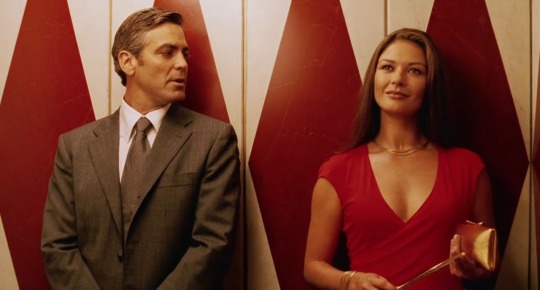
18. Intolerable Cruelty (2003)
For a duo with so much distinct style and flair for storytelling, this film feels the least like a Coen Brothers film. If anything, this feels like a script that sat on a shelf in pre-development hell, possibly for years, only for someone considering themselves a bit of a ‘maverick’ or ‘forward thinker’ to discover it and think that a dose of Coen Brothers magic could save it. Even with the star power of George Clooney and Catherine Zeta-Jones behind it, this one feels a bit too ‘by the numbers’ to stand out from an oeuvre that nears perfection.
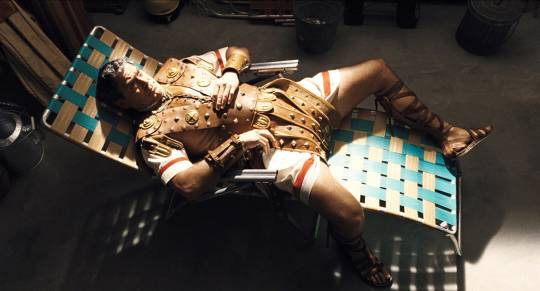
17. Hail, Caesar! (2016)
I’ll be completely honest with you all... I don’t remember much about this film. I remember enjoying it, but I don’t remember being blown away by it. I remember enjoying the colorful display of old Hollywood, and it’s always refreshing to see George Clooney lean into roles that border upon slapstick. For as much as I found this film not all that memorable, however, it stands above Intolerable Cruelty simply because it does not trigger bad memories.
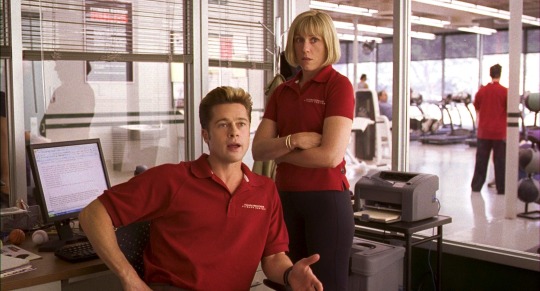
16. Burn After Reading (2008)
This film is what Intolerable Cruelty wanted to be... a property that is a hair closer to by the books, but full of a screwball approach that heralds to a forgotten era of film while using an incredibly stacked cast. Of all the Coen Brothers films I’ve seen, Burn After Reading feels like the property that all involved enjoyed making the most. Like many of the Coen Brothers films, the cast on this one is mega-stacked, and from top to bottom, everyone involved shines in roles that go against their standard types, or amplify the most off-beat aspects of their performing ability.
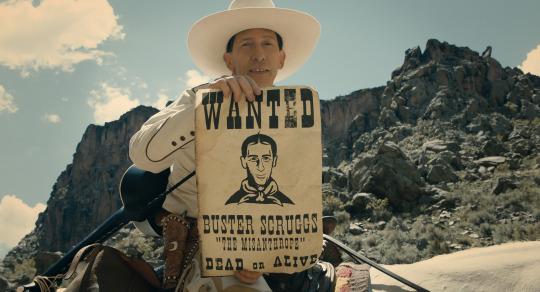
15. The Ballad of Buster Scruggs (2018)
The fact that Netflix was able to pull the Coen Brothers for a film is a win in itself, and with the duo choosing to do an anthology piece, Netflix was primed to maximize on their investment. While highly entertaining, however, the anthology nature of the property leaves it feeling a bit unfocused and disjointed at times... none of these stories really had enough meat on the bone to be expanded into feature-length films of their own, but for some reason, all parties involved passed on the opportunity to make a multi-episode serial rather than a film comprised of multiple tales. While using variance in storytelling methods and visual styles may work for some less talented directors, in the case of The Ballad of Buster Scruggs, it feels more like snack-sized bites in the place of true sustenance.
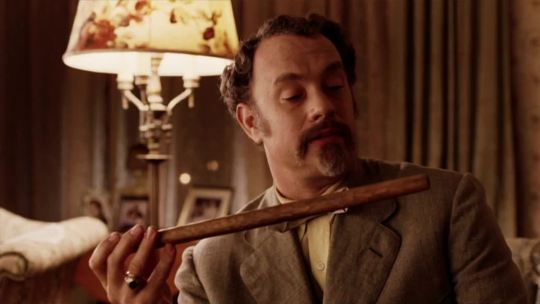
14. The Ladykillers (2004)
On paper, this film should have been a disaster. The Coen Brothers generally opt for original stories, so the fact that they chose to adapt such an obscure 1950s property for the modern day was strange, especially in light of the fact that most every element with the exception of Tom Hanks’ character was given a modern update. Somehow, despite all of this oddness, The Ladykillers managed to capture a sense of the classic Coen Brothers slapstick comedy that they famously established themselves with early on in their career. Tom Hanks is given the green light to go completely ridiculous, and to much of the viewers’ delight, he does so with great aplomb. His supporting cast shines, the comedic turn brings new energy to the story, and the southern gospel setting brings a rich sense of spirituality to an otherwise run of the mill film.
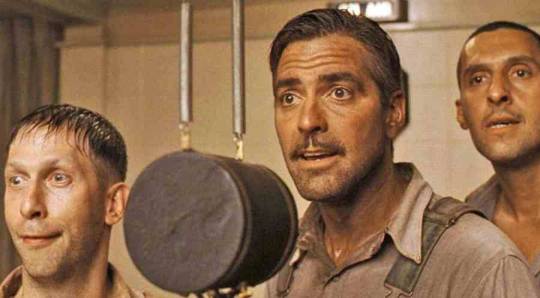
13. O Brother, Where Art Thou? (2000)
The Coen Brothers were essentially household names by the turn of the 20th century, but O Brother, Where Art Thou? propelled them into a legendary status. The grassroots mix of The Odyssey and the Robert Johnson crossroads legend took on a life of its own, leaving behind a soundtrack that birthed an entire generation of folk and bluegrass enthusiasts, as well as a film that showed the world George Clooney’s comedic chops. Much like The Ladykillers, O Brother puts viewers deep into the unfamiliar territory of Southern ‘discomfort’, with the African-American experience playing a major role in the narrative. Of all the Coen Brothers films one could use to introduce a stranger to their catalog, this one may be the best, as its infectious nature and stunning look leaves an impression on most anyone who has the pleasure to view it.
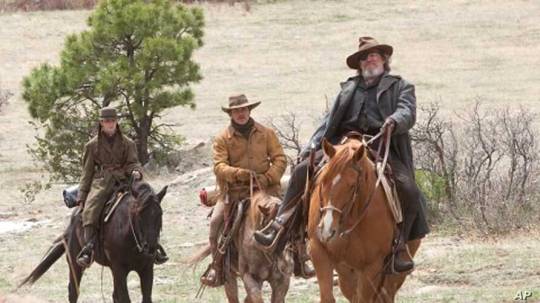
12. True Grit (2010)
The Coen Brothers had already covered a wide bit of genre ground within their first three decades, but surprisingly, they’d not done a true western up to that point (though many argue that No Country For Old Men is a modern take on the western). Therefore, when it was announced that their first western would be a remake of the iconic John Wayne film True Grit, many were surprised, and curious if they could pull it off. Not only did they pull it off, but in my humble opinion, they made a version that more than holds its own against the original. For the handful of big name and seasoned actors that signed on, it was the breakthrough performance of relative newcomer Hailee Steinfeld that outshined all. While The Ballad of Buster Scruggs was a fun revisit to the world of the western, True Grit was the kind of achievement that makes me want more traditional westerns from the duo.
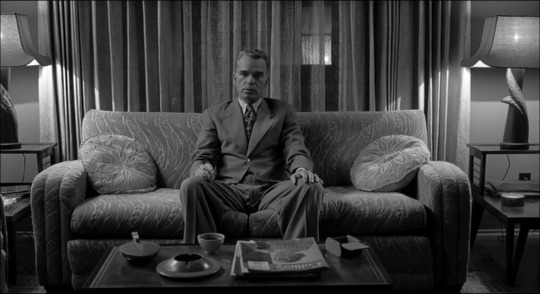
11. The Man Who Wasn’t There (2001)
Listing the Coen Brothers films is by far the most difficult ranking I’ve done to date, and the first film that really gave me trouble in terms of placement was The Man Who Wasn’t There. Personally, I find this film to be captivating and nearly flawless... Billy Bob Thornton’s detachment is rich and intrusive, which makes it all the more sinister when he does choose to exude even a hint of passion about something, be it positive or negative. The black and white photography, in league with the tone of the film, puts me in the mindset of films like In Cold Blood, and some of the sequences in the film stand out as some of the most iconic in the world of Coen Brothers films, especially the car crash. For a classic-style film noir, a genre that anyone with half a brain knew was a slam dunk for the Coens, the duo went above and beyond to both modernize and wholly embody the style. One of several Coen Brothers films that sits with you long after the final credits have faded away.
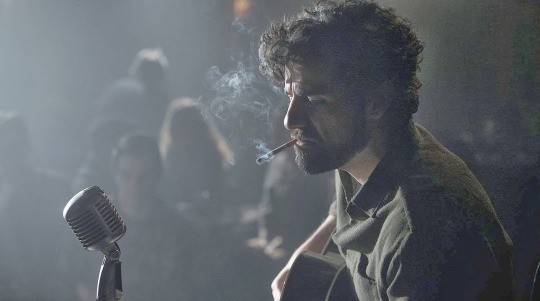
10. Inside Llewyn Davis (2013)
If this isn’t the darkest comedy in the Coen collection, it’s certainly giving the number one contender a run for its money. The intimacy of this film is unmatched within the broader collection of Coen characters, excluding The Dude, but the difference between Llewyn and The Dude is the personality equivalent of the difference between oil and water. You may marvel at Llewyn’s talent, but all the while, the film is screaming at you that “THIS IS A CHARACTER YOU SHOULD NOT ROOT FOR”. The symbolism found in the film is minimal while being incredibly effective in how it punctuates Llewyn’s personality and character, and the story structure is an equally subtle swerve that baits you into paying deeper attention, only to realize that the setup was the punchline the entire time.
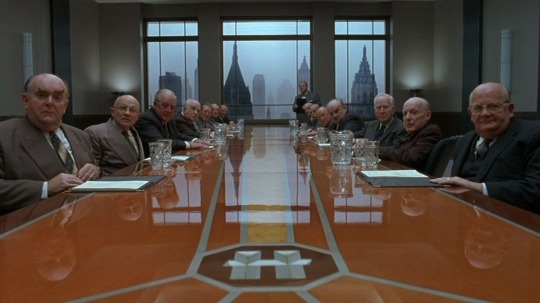
9. The Hudsucker Proxy (1994)
I’m a sucker for a Coen Brothers comedy, especially the ones that play like human cartoons, and one of their absolute best was The Hudsucker Proxy. The writing on this film is so tight that it would absolutely pop if it were any tighter. The entire A Christmas Carol-esque approach to the story makes it a wonderful moralistic tale that makes people laugh so much that they often don’t realize they are being taught a lesson about morals, integrity and self-respect. Tons of familiar character actors fill the frames, everyone tasked with supporting roles fit firmly and comfortably into the created world, and the man trio of Tim Robbins, Jennifer Jason Leigh and Paul Newman are functioning on genius levels of performance... especially Jennifer Jason Leigh. While not quite a holiday movie, there is enough of a holiday sense that it could be shoehorned into a seasonal viewing, but any time set aside for this gem is the right time to watch it.
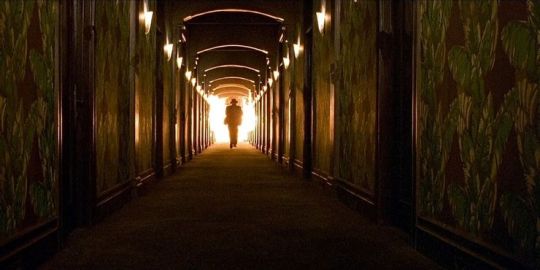
8. Barton Fink (1991)
In my humble opinion, this may be the strongest end to end performance from John Turturro in his long and storied career. As clear-cut fans of film, it is always a pleasure to see the Coen Brothers explore the world of film, and by using this approach, they are able to tell a bold, brash and haunting tale about the issues that come with assumptions about character and talent. The takes on Hollywood and the indifference of those in power, especially when it comes to assisting young and promising talents that may one day usurp them, and powerful. The real bow on the story, however, is the larger than life presence of John Goodman, who goes from being a slightly aggressive and overbearing sense of support to a literal madman by both name and action. For a film that mainly consists of individuals talking to one another about passion, talent and secrets, there is a kinetic energy that feeds the forward momentum of this movie, and for that, it stands out in the Coen collection.
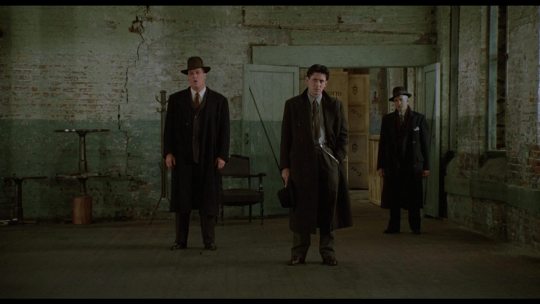
7. Miller’s Crossing (1990)
It’s not surprising that the Coen Brothers could make a compelling and memorable gangster film, but I don’t think that anyone expected a film as vicious and dark as Miller’s Crossing. For a duo that generally relies on nuance and contemplation to get their points across, this film certainly proves that they are more than capable of excelling in the direct approach as well. The era-specific costuming is outstanding, the murky city areas stand in stark contrast to the woods of the titular Miller’s Crossing, and the sheer volume of bullets are a stark reminder of the Prohibition-era story we are viewing. Gabriel Byrne shines in his lead role, bringing a world of fury, deceit and mistrust in tow with him. The iconic hat blowing in the wind serves as not only the biggest memorable moment from the film, but possibly also the single moment of peace and beauty found in a film that holds up a dirty mirror to a dark world.
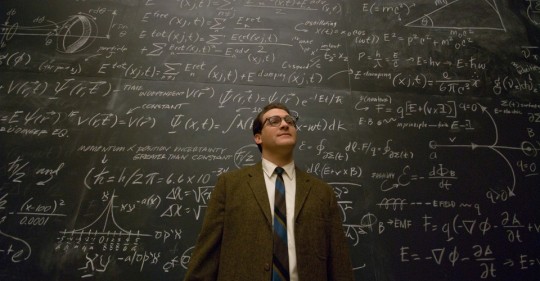
6. A Serious Man (2009)
Of all Coen Brothers films, this is easily the most underappreciated and slept on of the bunch. I’m a sucker for movies that embrace Murphy’s Law, and when mixed with the parable nature of the Book of Job, we are presented with a darkly comic and relatively unique version of the hero’s journey. The way that the personal, professional and philosophical problems pile up on Michael Stuhlbarg’s Larry are meant to be felt by the audience, and the way that his bad luck boomerangs out into the world during the film’s resolution must be seen in order to be believed. The way that destiny and chance dance around one another in this film is narratively breathtaking, and for such a subtle film, it is a truly remarkable achievement.
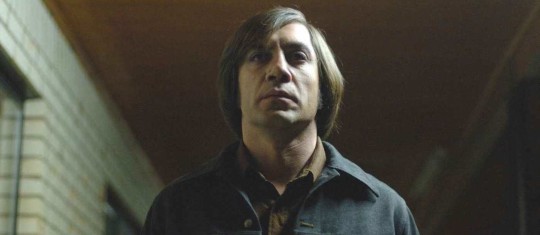
5. No Country For Old Men (2007)
When you think of the Coen Brothers, you don’t necessarily think of evil incarnate, and yet, the duo succeeded in capturing a character in the form of Anton Chigurh, the closest thing to the Terminator that the duo has ever created (to my knowledge). The story is a wonderful, subtle tale of how the times can change into something we don’t recognize before we recognize the change, but it is easily Javier Bardem’s iconic performance that gives this film all of its power and ominous energy. His unyielding forward momentum, his disdain for obstacles in any form, and his disregard for human life are enough to instill real fear into those who partake in viewings, and his presence will more than likely haunt you far beyond completion of the film. A true modern-day masterpiece that would have been higher, if not for...

4. Blood Simple (1984)
What a powerful debut, and one that not only hinted at, but outright put the spotlight on the promise of the Coen Brothers when it came to stark visuals and stunning storytelling. For such a simple, small scale story, the tangled web that is woven is a slippery slope of deception and distrust that leaves little to no survivors in its wake. The scale of the film is deceptively small, but the quality shines in every aspect that it can. Seeds are placed that pay off wonderfully, and the color palette presented gives the film the feeling of a Technicolor film-noir. Much like A Serious Man, Blood Simple deserves to be talked about and held up much more than it is by fans of film.
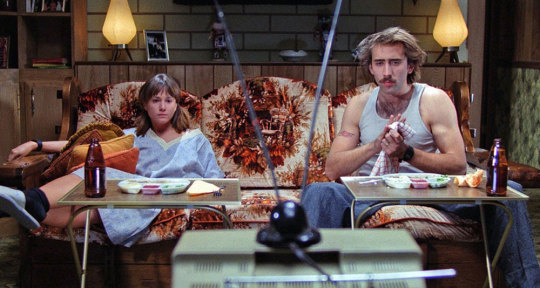
3. Raising Arizona (1987)
What a wonderfully ridiculous movie about something as simple as the trials and tribulations of navigating love, marriage and parenthood. The most hilarious aspect of this film, in my opinion, is how it feels like a living and breathing cartoon, both in terms of the character performances and the outrageous events that take place within the world of the film. Nicolas Cage is operating on a completely different level, Holly Hunter is equal parts charming and hilarious, Trey Wilson is wonderfully over the top, John Goodman and William Forsythe bring excess hilarity to the wild proceedings, and Randall “Tex” Cobb is downright iconic in terms of his ridiculous character. The pacing of the film is breakneck and feverish, the comedy hits never stop coming, and the utter charm emanating from the midst of the caper presented is infectious. As a second film, this could not be any more different than Blood Simple, and yet somehow, it connected so vividly with viewers that it remains a must-watch film to this day.
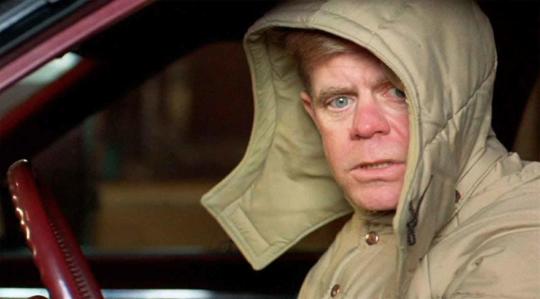
2. Fargo (1996)
What is there to be said about Fargo that has not already been said? For a duo with more iconic films to their name than some directors have completed films, Fargo was an immediate signal that the limits of the Coen Brothers’ creativity and skill had not even began to show its full breadth. Within less than five years of release, the film was already heralded as a classic (of all-time, not just modern day), the mystery surrounding its possibility of being based on a true story built a world of intrigue around the movie, and it has gone on to create a universe of its own in the form of an FX TV show that recently wrapped its fourth season. There is not a wasted role in this film, and to this day, any movie fan worth their salt will happily bust out their version of a Minnesota accent that is almost certainly based on one of the many memorable characters that inhabit the world of Fargo. Numerous actors, including William H. Macy, Frances McDormand and Steve Buscemi, all found breakout success in the wake of this wonderful film.
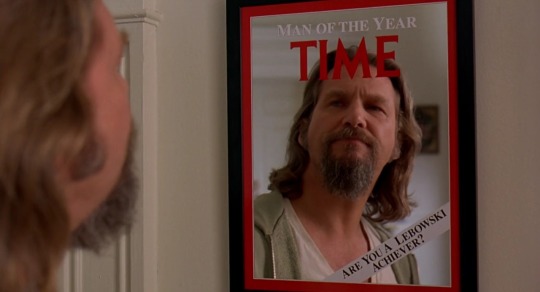
1. The Big Lebowski (1998)
Was there ever any doubt for this placement? For everything that Fargo did in terms of success within the world of the film industry, The Big Lebowski did that and more for the worlds of the counter-culture and cult film fans. The story we are presented with is so simple, yet so ridiculous in its journey, that it almost insists on viewers revisiting it over and over. Like many Coen Brothers films, nobody cast in the film is wasted or misused, and due to these stellar performances, the film finds itself as one of the most quotable in recent memory. Much like the performances of the cast, the writing does not waste any words or opportunities, often referring back to itself in extremely subtle and nuanced ways that present themselves over time, and to hilarious effect. Nobody would have expected a film of this nature to have a fandom, and yet, the legions of fans for this film are unique to that of the Coen Brothers catalog in the sense of their dedication, devotion to and love of the movie. While not everyone’s cup of tea upon first viewing, The Big Lebowski is truly an example of the gift that keeps on giving.
If the Coen Brothers never make another film, they’ve already created and achieved more in their journey that most filmmakers can dream of. Many of their films could honestly be considered works of art, and nearly all of them are compelling with an ability to leave deep and lasting impressions. If you are unfamiliar with the Coen Brothers, do yourself a favor and check out their work, as it may bring a new sense of invigoration to your love of film.
Editor’s Note (12/10/2020) : Inside Llewyn Davis added to the number 10 position, all films ranked lower adjusted accordingly.
#ChiefDoomsday#DOOMonFILM#JoelCoen#EthanCoen#CoenBrothers#BloodSimple#RaisingArizona#MillersCrossing#BartonFink#TheHudsuckerProxy#Fargo#TheBigLebowski#OBrotherWhereArtThou#TheManWhoWasntThere#IntolerableCruelty#TheLadykillers#NoCountryForOldMen#BurnAfterReading#ASeriousMan#TrueGrit#InsideLlewynDavis#HailCaesar#TheBalladOfBusterScruggs
4 notes
·
View notes
Link
As coldly drawn as an atlas yet no less capable of enflaming the imagination, Mona Fastvold’s “The World to Come” is a hard and brittle period love story that thaws into something much warmer — what its hyper-literate heroine would call “astonishment and joy” — as a merciless 19th-century winter blushes into a most unexpected spring.
Tuesday, January 1, 1856. Abigail (Katherine Waterston) mourns the daughter who was taken by diphtheria a few months prior, and journals about a world that feels barren in the young girl’s absence. “This morning, ice in our bedroom for the first time all winter,” she reads aloud in voiceover, offering the first excerpt from an interior monologue so pronounced that Fastvold’s romance often feels like an epistolary film written by a woman to herself. “The water froze on the potatoes as soon as they were washed. With little pride, and less hope, we begin the new year.”
And what a new year it will be for the ever-studious Abigail, an overgrown schoolgirl who likens her loneliness to “a library without books.” It will begin with new neighbors. It will bloom with new memories. And it will shudder with the tectonic aftershocks of a woman who — with no means of escaping her nook-like place in the world — dares to remap herself.
That cartography motif provides “The World to Come” with a clear sense of place from the moment it starts; the credits are scrawled above a map of upstate New York (played with patience and edenic possibility by the hills of Romania), and they give way to a valley so petrified in gray ice, even the slightest hints of color seem exotic. Embodied by a mealy-mouthed Casey Affleck (whose quietly moving performance as Abigail’s husk of a husband sneaks up on you), Dyer bristles against the depressive pall that’s settled around their house like it’s just another fallow period any farmer worth his beard could survive. “Contentment is like a friend he never gets to see,” Abigail notes in her journal with a novelist’s sense of invention, sketching the inner life of a spouse always less expressive than his shadow. They may be married, but what can that really mean to a woman who’s only met a handful of people in her life? At night, he grabs her breast and offers her another child. Abigail requests an atlas instead.
It could be worse. Abigail could be married to the more controlling Finney (Christopher Abbott), a jealous brute who’s just leased out the log cabin nearby and doesn’t appear to have any inner life at all. Not that his wife Tallie (Vanessa Kirby) would try to draw it out if he did. Unlike the bookish Abigail — who’s been raised to think of the world as a hidden empire built of ink and imagination — Tallie walks through life with her chin up, her cheeks flushed, and her hair caught in the wind. She is a woman less compelled by what she can imagine in her mind than what she can feel on her skin. Things like the webbing between Abigail’s fingers, which Tallie explores with unclear intentions as the two prairie housewives trade polite gossip about their husbands.
Has Tallie been with a woman before? Has any woman been with a woman before? Abigail doesn’t know the answers to these questions, or even how to ask them. All she knows is that the house seems warmer after Tallie’s visits. The swirling winds of Daniel Blumberg’s clarinet score — which can whip into a winter storm at a moment’s notice — grow as warm and soothing as an orange hearth. And a story that opens with the grief-stricken chill of a rustic horror movie starts to pull focus away from its monsters, eventually settling into a harsh but hypnotic love story less rewarding to watch than it is to remember.
In that respect, it differs from a recent spate of similar films. Critics — and this one speaks from experience — should be careful about relating every restrained sapphic romance to the likes of “Carol” or a Céline Sciamma movie. But Fastvold’s stiff knockout of a second feature (which arrives six years after “The Sleepwalker,” and trembles with the same intensity its filmmaker wrote into the scripts for “The Mustang” and “Vox Lux”) shares a common interest in female interiority and the sweet vertigo of falling in love. “The World to Come” takes that pioneer spirit and runs with it deep into the woods, even if its characters spend most of their lives standing in place, even if the movie around them — which entwines the furtive eroticism of “Portrait of a Lady on Fire” with the kerosene ache of “The Assassination of Jesse James by the Coward Robert Ford” — owes as much to the latter as it does any of its more obvious influences.
Without “Jesse James,” “The World to Come” literally wouldn’t exist. Andrew Dominik adapted the Western from a history book of the same name, sparking an artistic kinship between Affleck and author Ron Hansen — whose writing partner Jim Shepard got the idea for a novella about a forbidden affair when he found a note scribbled in the margins of an old farmer’s journal: “My best friend has moved away, I don’t think I will ever see her again.” When Hansen and Shepard offered Fastvold the script version, Affleck came with it, as did the implosive fatalism he brought to the role of Robert Ford, and the bitter survivalist mindset of living at nature’s mercy.
“The World to Come” is so withholding that the characters from “Portrait of a Lady on Fire” are practically sky-writing their emotions by comparison, and Fastvold’s film — despite its delicate lilt of a last scene — never detonates inside of you with remotely the same force. It’s jabbing and elliptical instead of lush and symphonic; old-fashioned where some of its predecessors have thrummed with contemporary zeal. No one filters drugs through armpits, or scissors their bodies into shapes that Abdellatif Kechiche might cut together. On the contrary, Abigail and Tallie are seldom onscreen together at all, and only in hindsight can we appreciate how charged the space between them is when they are. Fastvold shoots the movie at a polite and unfussy remove, the fuzzy vibrations of Andre Chemtoff’s 16mm cinematography hinting at an energy invisible to Abigail and Tallie’s husbands.
Many of the script’s most pivotal moments are folded into the margins like the two lines of chicken scratch that gave birth to these characters; each scene begins with the date scrawled across the scene as Abigail reads from her diary, and it isn’t until the end of the movie that you realize how much she’s kept hidden from us. It’s enough to know that she has access to it, and always will, but it’s also frustrating that we’re stuck watching some more ordinary histrionics instead. Abbott’s performance shivers with a sociopathic affectlessness, but “patriarchy incarnate” is thin gruel in a film where everyone else gets to play so many layers (even Affleck, who earns Dyer some hard-won dimension by the end). It’s not that his character doesn’t ring true, nor that Finney’s jealous chaos is at all contrived. Only that his destructive boorishness is such a plain way to spoil a story this ornate, like a wedding invitation embossed in comic sans.
But “The World to Come” is about the things we remember, and not the ones so easy to forget. “I hold our friendship and study it,” Abigail writes of her bond with Tallie, “as if it were the incomplete map of our escape.” Whether or not she ever finds her way free, the first half of 1856 will linger in Abigail’s mind like all of the best love stories do, her neurons and nerve endings rearranged into forest trails that forever lead back to the legend that explains them.
Grade: A-
“The World to Come” premiered in Competition at the 2020 Venice Film Festival. It is currently seeking U.S. distribution.
5 notes
·
View notes